
The popularity of JavaScript continues to grow. In 2017, IBM called it one of the most promising multi-paradigm programming languages of modern times. JavaScript is used both on the client- and server-side, helping to create simple and convenient interfaces and has extremely broad functionality. Besides, its field of use isn’t strictly limited. You can use JS for PC, mobile, and even server applications.
The work of developers becomes much easier thanks to JavaScript frameworks (sets of JS code libraries). These are templates created to solve the most common programming tasks. JavaScript frameworks let developers forget about routine actions, save time, and use ready-made optimal code for typical programming needs.
It’s important to understand the difference between JavaScript frameworks and JavaScript libraries. Frameworks are a skeleton, a template that restricts the architecture of the created application. Developers expand this basis but are only guided by the definite rules for Javascript frameworks. The libraries don’t have such limitations.
A borderline between JavaScript frameworks and JavaScript libraries is quite shaky. If a JS library develops, starts solving abstract tasks, and influences the coding style, it becomes a JavaScript framework.
Here are the benefits of Javascript frameworks:
- Effectiveness: Templates make the development process more efficient.
- Security. Popular Javascript frameworks have decent security mechanisms. They are supported by large IT communities, whose members often contribute as free testers.
- Cost-effectiveness. The development cost is lower. Many Javascript frameworks are free and save the time of application developers reducing expenditures.
The popularity of Javascript frameworks won’t necessarily last forever. For instance, Angular JS actively grew from 2013 to 2015 and then stagnated at the achieved level. Below there is a list of Javascript frameworks included in this overview. We’ll provide a brief statistics analysis for each of them. Note that this isn’t a rating of frameworks. A position in the list doesn’t mean that a particular framework is better or worse than others.
- Angular JS
- Aurelia JS
- Backbone.js
- dhtmlxSuite
- Ember.js
- jQuery
- KnockoutJS
- Meteor.js
- Node.js
- Polymer.js
- PureMVC
- qooxdoo
- React.js
- Sencha Ext JS
- Socket
- Spine
- Titanium
- Vue.js
JS Framework Angular JS

Angular JS framework was created in 2009 to develop single-page applications. It doesn’t require much experience, so even a newbie can write the first simple applications after a few hours of mastering Angular JS.
In 2014, developers announced the creation of Angular JS 2.0. Yet, there were so many deep changes that in 2016, a new Angular framework appeared. However, the angular JS framework continued to develop independently, partially explaining the slowdown in its popularity growth after 2016.
Angular JS popularity based on Google Trends data
This JavaScript framework started growing in popularity in 2012. The rapid growth happened between 2015 and 2016. After that, the period of stagnation has started with a slight decrease in demand.
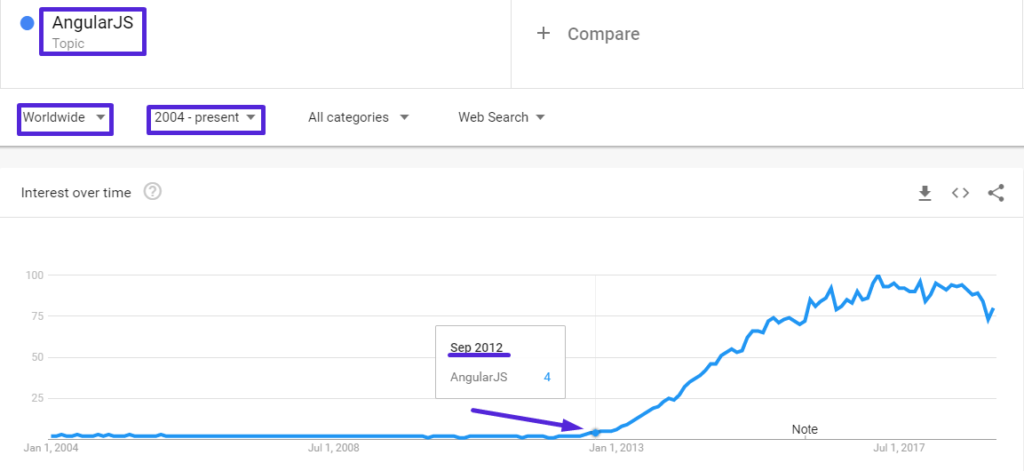
The statistics of the US show a 5 year period of growing interest in the JavaScript framework. Since 2015, the Angular JS demand has remained at the same level with no considerable fluctuations.
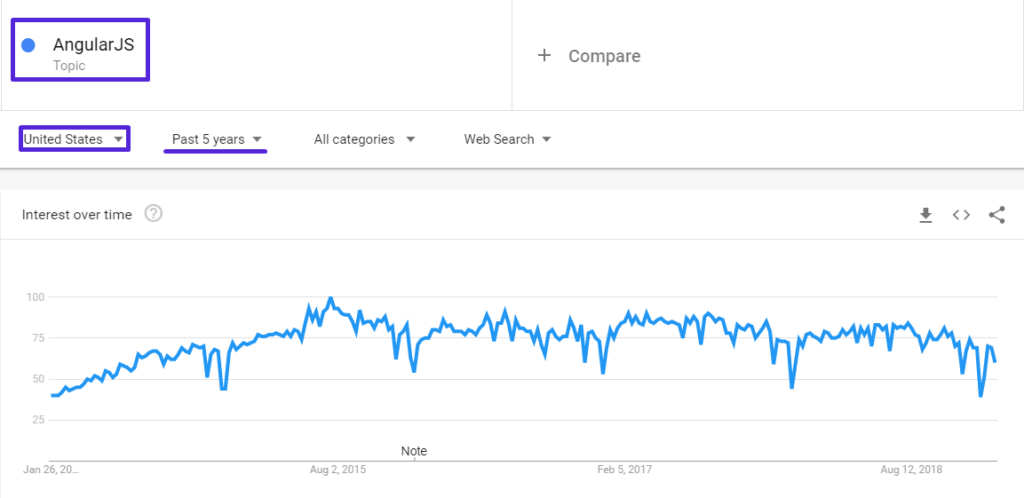
India shows similar tendencies. After an active growth, the popularity has stopped at the same level, and a small part of the audience was lost.
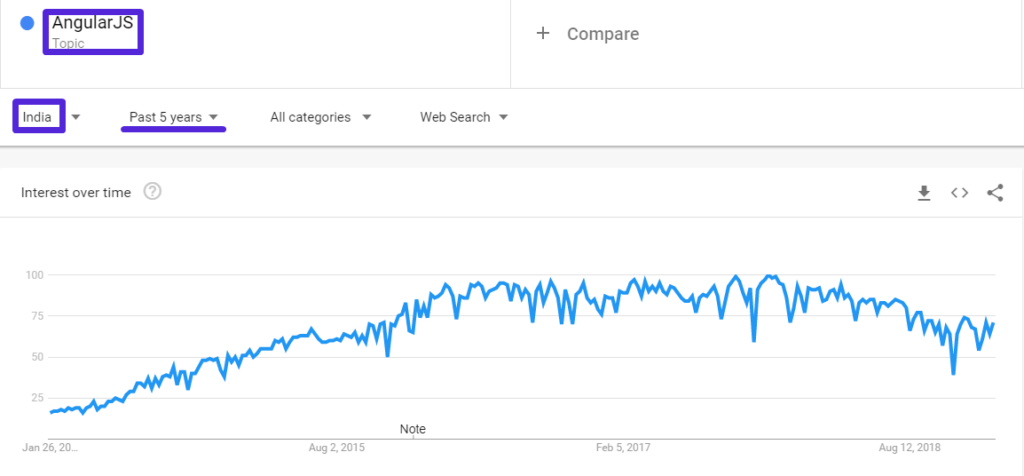
In the United Kingdom, Angular JS repeats its fate. If you look at the graph, you’ll notice how a 2-year popularity decline follows the rapid growth. It’s a typical cycle for any framework.
When a new technology appears, developers test it for 1.5-2 years. After that, they sometimes return to old technologies. This explains the peaks on the graph.
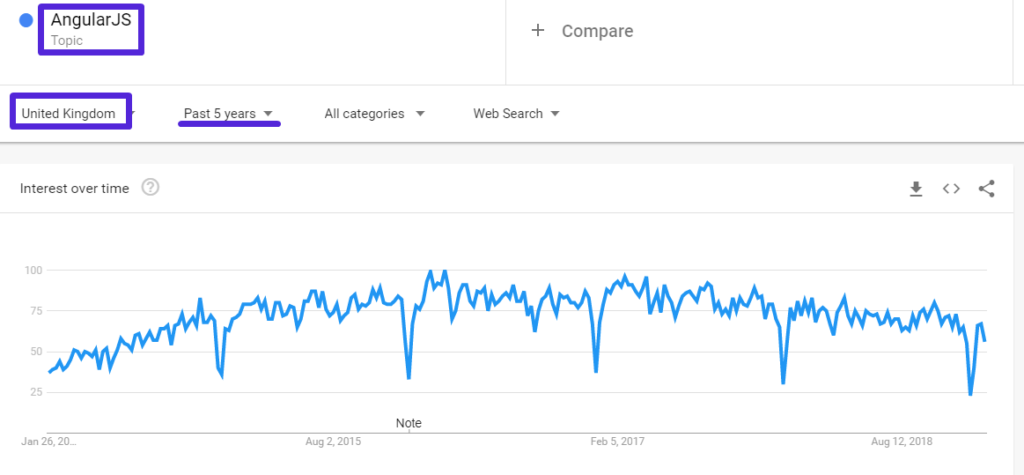
Keyword analysis based on Google Ads Keywords data
Judging by the volume of Angular JS search requests, we may conclude that the interest in this framework stays at the same level. The search query volume has slightly increased compared to the start of the analyzed period.

Most search requests were made in the US and India – these countries decisively take the lead. On the other hand, Germany and France together account for 7.9% of the total number of search queries related to the JavaScript framework, Brazil – 3.3%, and 52.6% – the rest of the world.

Linkbase and the number of references on the web
In total, the website of Angular JS developers is referenced by 20,772 domains. The number of backlinks reaches 1.81 million, most of which place a dofollow link. The other types account for only 9% of the entire linkmass.

There are world-renowned social networks, information portals, and services among the domains with the highest domain ratings, such as youtube.com, linkedin.com, reddit.com, etc.
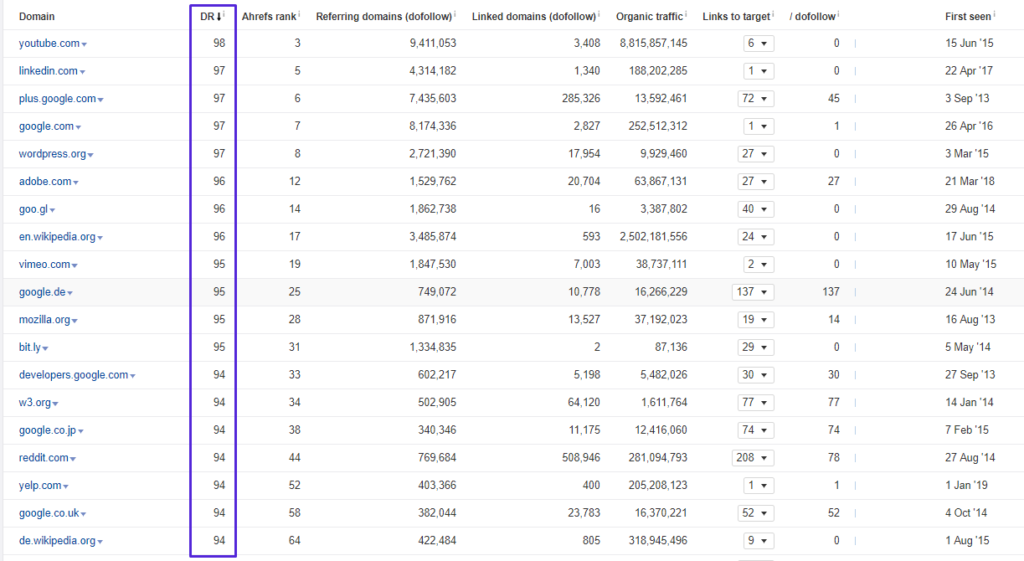
JavaScript Framework Angular JS is mentioned 6.82 million times on the web.

JS Framework Aurelia JS

This JavaScript framework is a brainchild of Rob Eisenberg, the creator of Caliburn. Micro and Durandal used to be popular. Rob was a part of the Angular team, but they failed to find common ground. That’s why he split and started working on his own framework. That’s how the story of Aurelia JS has started.
It is called the JavaScript framework of the next generation, ideal for web and mobile apps. Aurelia JS stands out with its compactness and unobtrusiveness. This means that specific JavaScript framework constructions almost don’t clutter your code. Moreover, it’s very convenient and helps to master Aurelia JS.
Aurelia JS popularity based on Google Trends data
The growth of Aurelia JS’s popularity started in 2014. For 2.5 years, it was attracting more and more interest until the beginning of a gradual decline in 2017. As of April 2020, the interest in the framework was approximately at the same level as immediately after its release in January 2015.
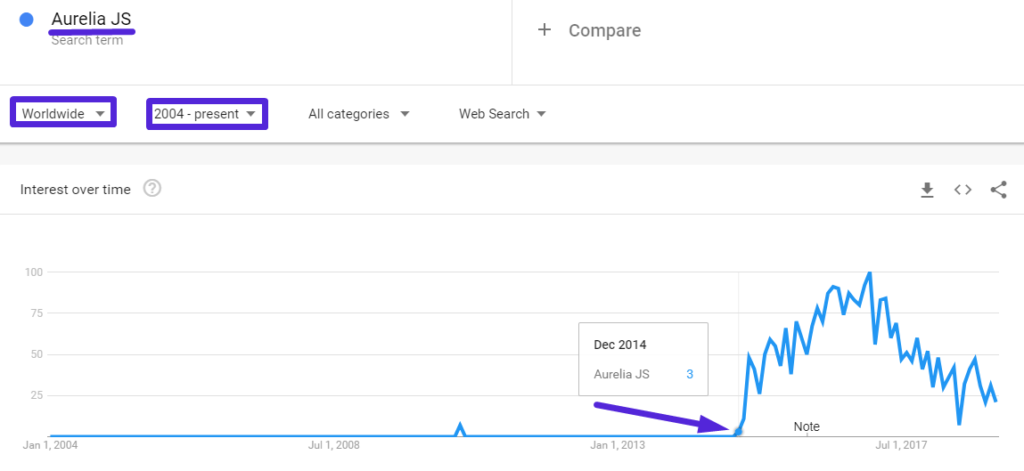
In the US, the downward trend in Aurelia JS demand isn’t as noticeable as in the previous chart. The peak was in 2015-2016. It’s a typical situation for all JavaScript frameworks. After that, developers gradually shifted attention to new products, and the interest in Aurelia JS started to fade. Yet as of summer 2018, the decline wasn’t critical.
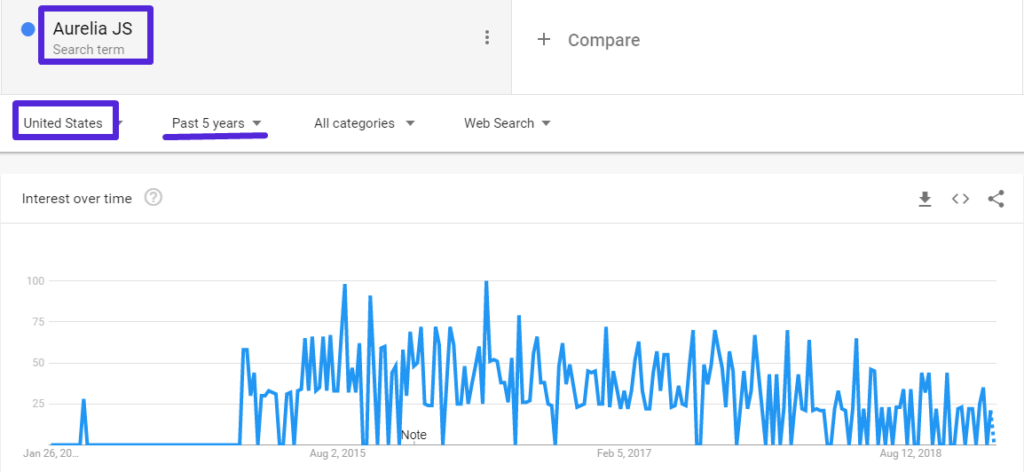
India has a similar picture. The only difference is that the average Aurelia JS demand was about half as low as 2015-2016.
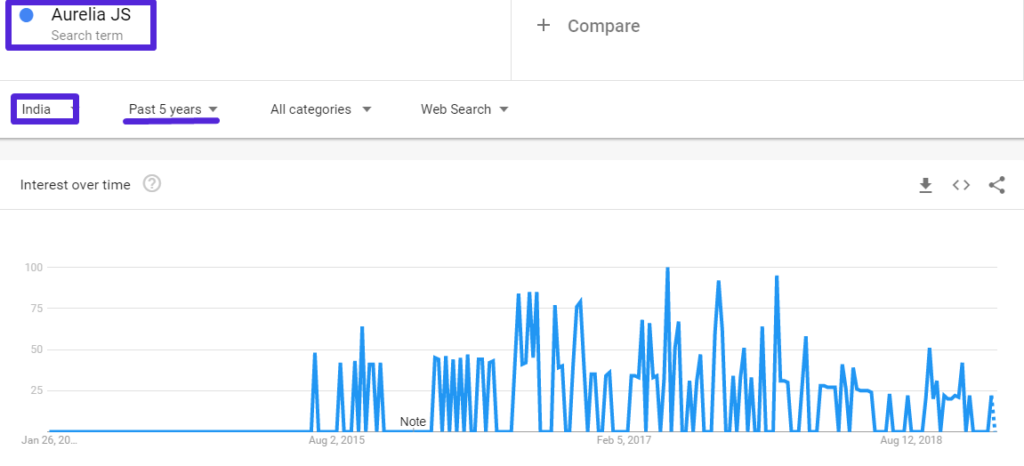
Over the past 5 years, the UK situation has reflected the tendencies in other countries: constant growth and subsequent decline in JavaScript framework popularity. The average popularity already began to shrink in 2018.
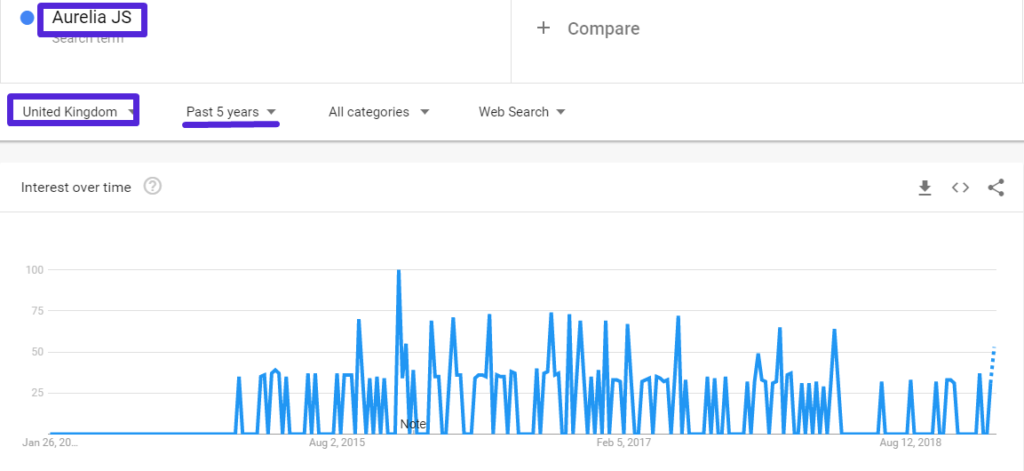
Keyword analysis based on Google Ads Keywords data
The analysis of Aurelia JS search volume in Google shows continuous growth since 2014. Such stability proves that users remain interested in Aurelia JS. This relates to both mobile and total searches.

The keyword searches have mainly been distributed among India (20.7%) and the US (17.8%). On the other hand, EU countries are represented by England (6.8%), Germany (6.7%), and France (3.2%).

Linkbase and the number of references on the web
Aurelia JS website is referenced by 1,325 domains with 27,200 backlinks. The crushing majority of them (77%) place a dofollow link.

As to the domain rating, information services and portals take the lead (e.g., youtube.com, microsoft.com, reddit.com, and more).
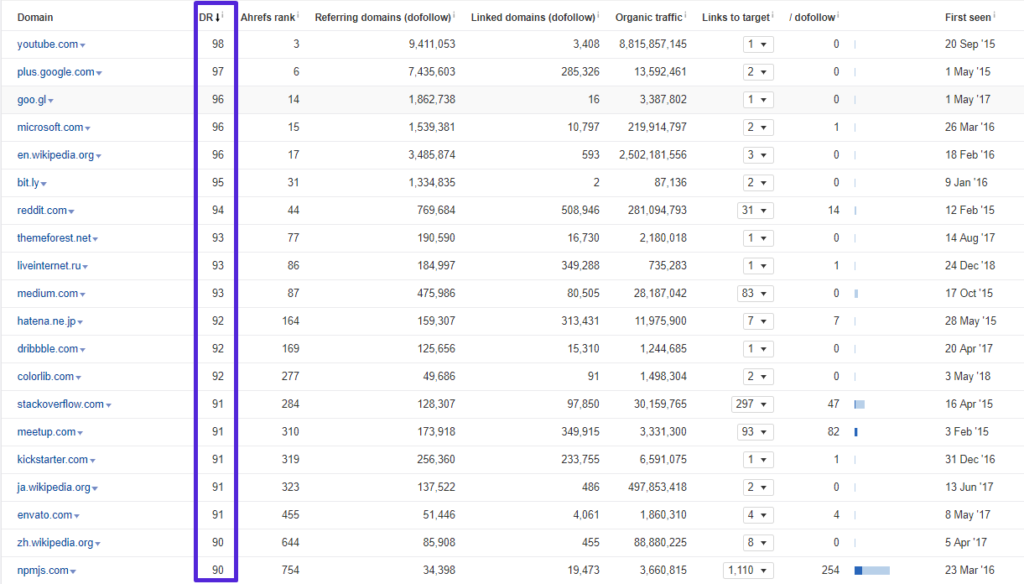
Aurelia JavaScript framework is mentioned 14400 times on the web. So it’s comparatively a modest number.

JS Framework Backbone.js

Backbone JS appeared in 2010 as a counterpart of heavyweight frameworks. It would be more correct to call it a library. Although Backbone JS is a lightweight solution, you’ll need to make up for the missing functionality with code or third-party plugins. Note that Backbone JS requires jQuery or its analog. Since it’s rather a library, you can use its separate parts.
JS Framework popularity based on Google Trends data
Right after the release in 2010, Backbone JS started to gain popularity. The framework reached its peak in 2013. Since 2014, the interest has been declining to drop to the level of 2010 in 2018.
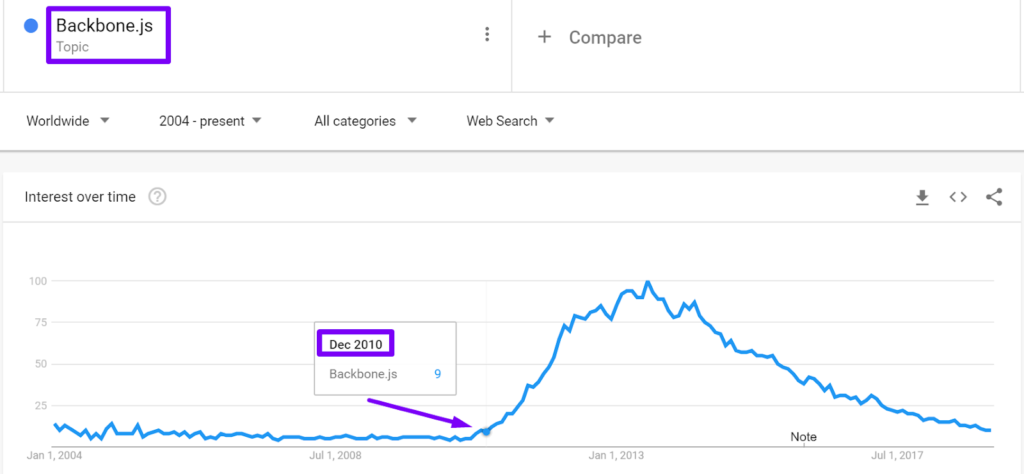
In the US, the demand for Backbone JS has decreased by more than 3 times since 2014.
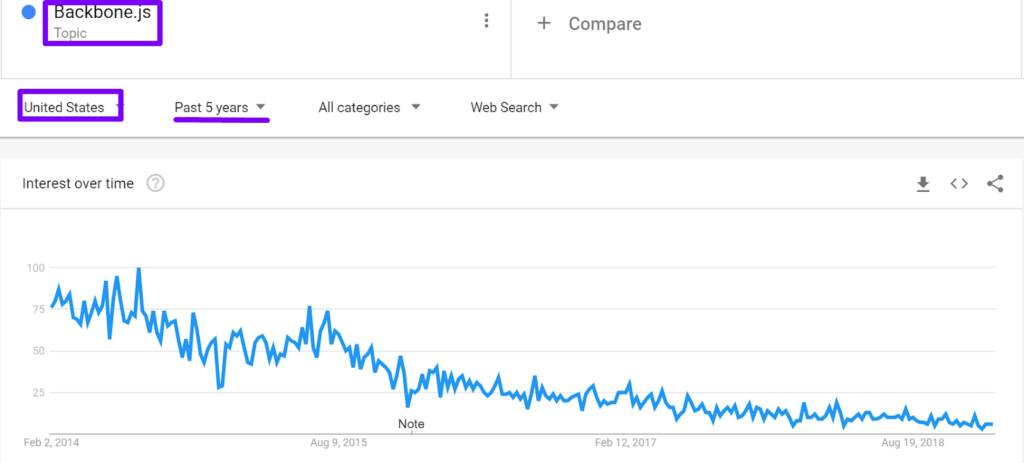
We can track the same trend in India. In 2018, the popularity of Backbone JS was 4 times lower than its peak value.
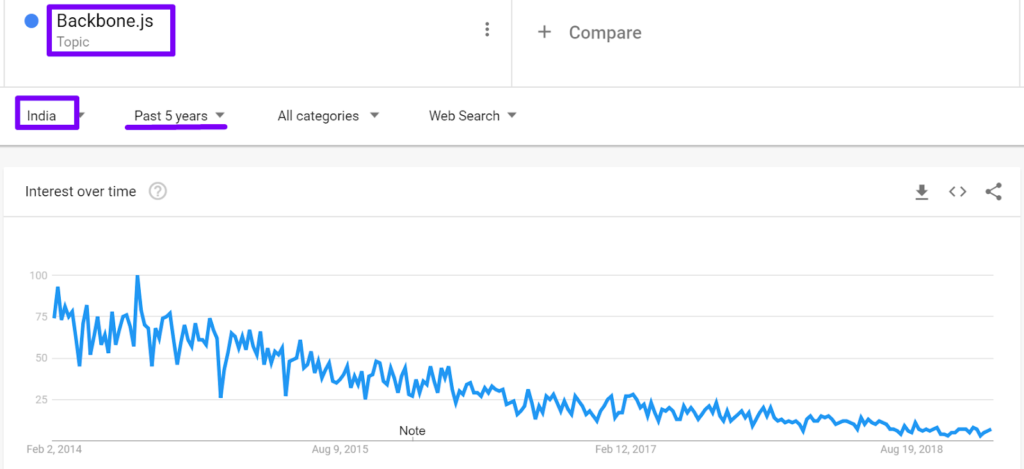
Again, the United Kingdom users show the same interest as Americans and Indians. Their popularity curves are very similar. The interest in the framework gradually declines with periodic peaks.
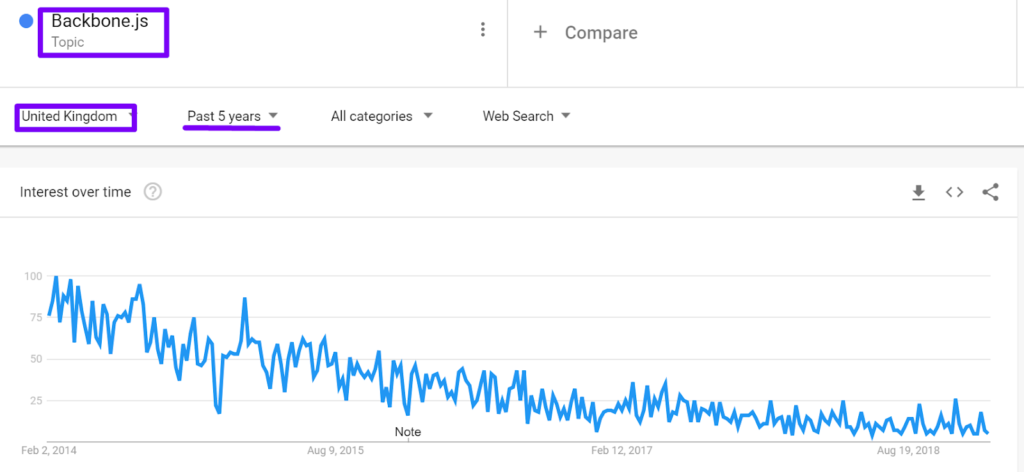
Keyword analysis based on Google Ads Keywords data
Analyzing this graph, you can observe a continuous decrease in search queries from 2015 to 2017. Besides, Backbone JS was even more rarely searched on mobile devices. In 2017, the interest in Backbone JS had rapidly grown. The number of related search queries has also increased on mobile devices.

As to the search distribution by country, the leaders are India (27.6%), the US (17.0%), Brazil (4.2%), and Japan (3.3%). From the EU countries, only France with 3% searches has got to the top.

Linkbase and the number of references on the web
6,045 domains link to Backbone JS website with 82,100 links. Out of this number, 87% are dofollow links.

In terms of domain rating, information portals and various services have maximum rates.
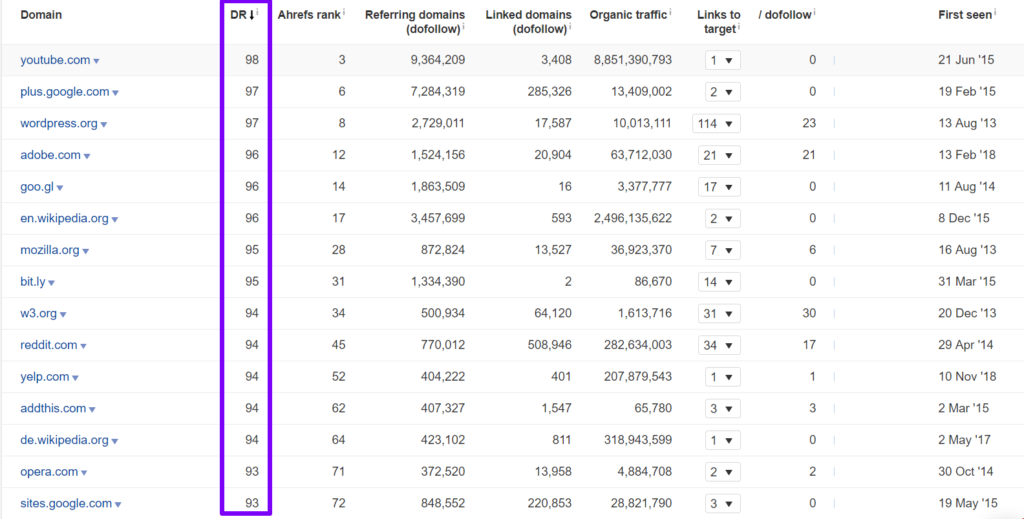
There are 2.12 million mentions of Backbone JS online.

JS Framework dhtmlxSuite

This library is suitable for cross-browser web and mobile applications. It allows using DHTML site components separately and has great compatibility with other programming languages. In addition, you won’t need a lot of experience to start development.
Its widgets are compatible with ASP.NET, Java, ColdFusion, Ruby, Grails, and other server technologies. Also, the DHTML site supports SON, TypeScript, Promise API. It’s also worth noting that the documentation of this framework is easy to understand, so you’ll need a minimum of time to master it.
JS Framework popularity based on Google Trends data
DHTML site started to gain popularity in 2007, achieving a peak at the end of 2012. After that, the interest in this technology has begun to decline.
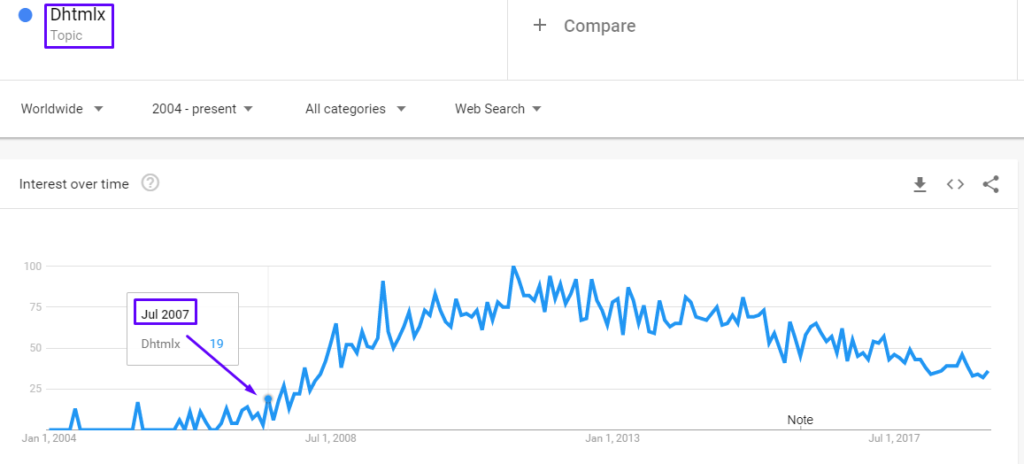
In the US, the highest interest in this JavaScript framework can be observed in 2015. However, during the following years, it has been less demand.
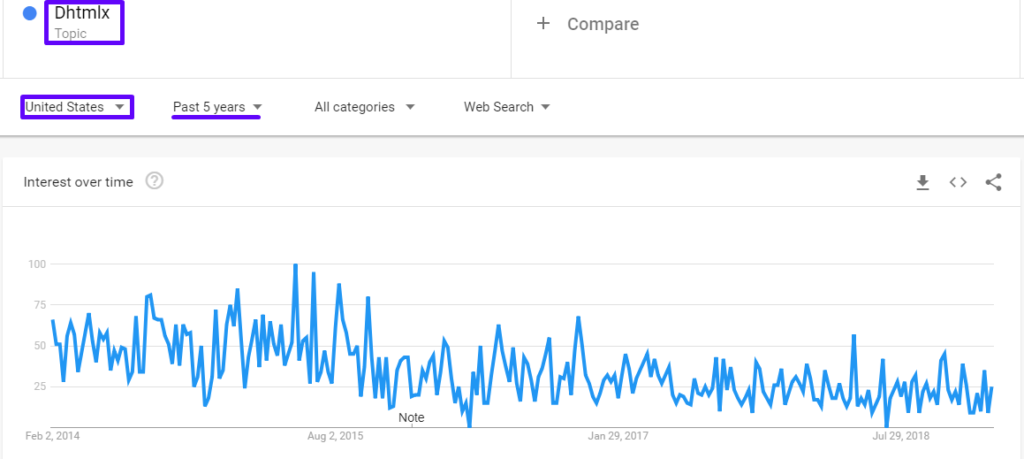
The statics on India reflects the same trends. After the peak in the summer of 2015, the demand for the DHTML site framework has started to drop. Today, the DHTML site is more than 4 times less popular than when it reached its maximum.
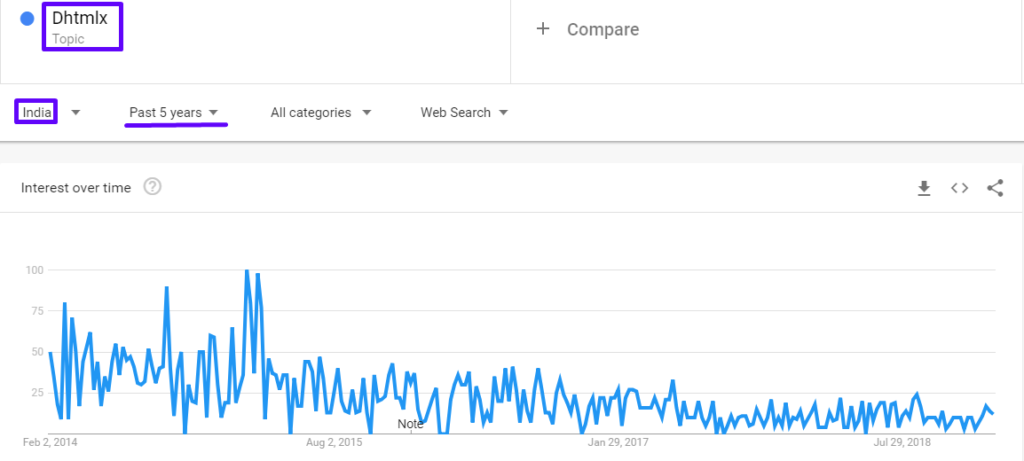
In the United Kingdom, the downward trend is less noticeable. Moreover, although the peak values used to be higher, the decline is less abrupt than in the US and India.
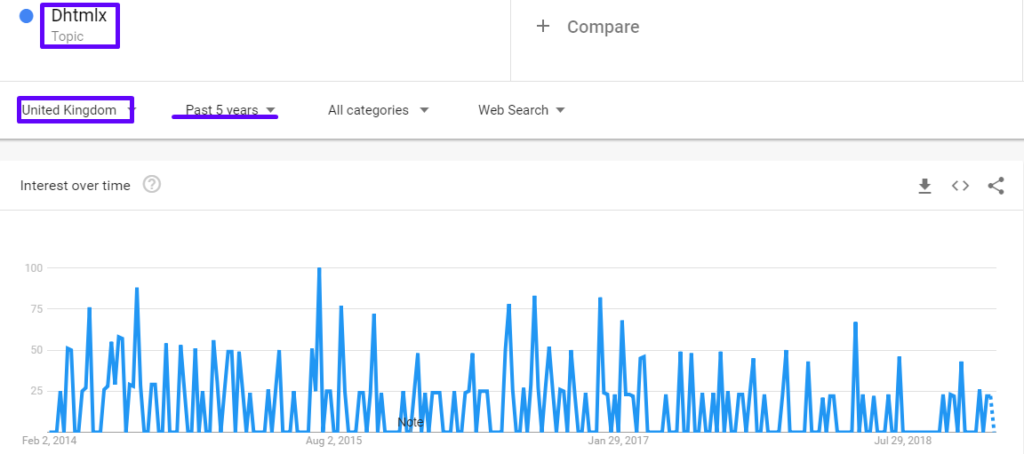
Keyword analysis based on Google Ads Keywords data
The analysis of the volume of dhtmlxSuite related search queries proves the steady decline in the interest in this JavaScript framework. Besides, there was almost no activity on mobile devices.

The United States and India lead search queries with 11.3% and 8.2%, respectively. In Europe, the DHTML site is the most popular among Germans, with a 5.5% rate.

Linkbase and the number of references on the web
2499 domains include up to 145,000 links to dhtmlxSuite website. The dofollow links amount up to 72% of the total number of links.
In this case, the ratio of links to the number of domains is too large, adversely affecting the website’s domain rating.

Information portals and entertainment services have the highest domain rating among the referring resources.
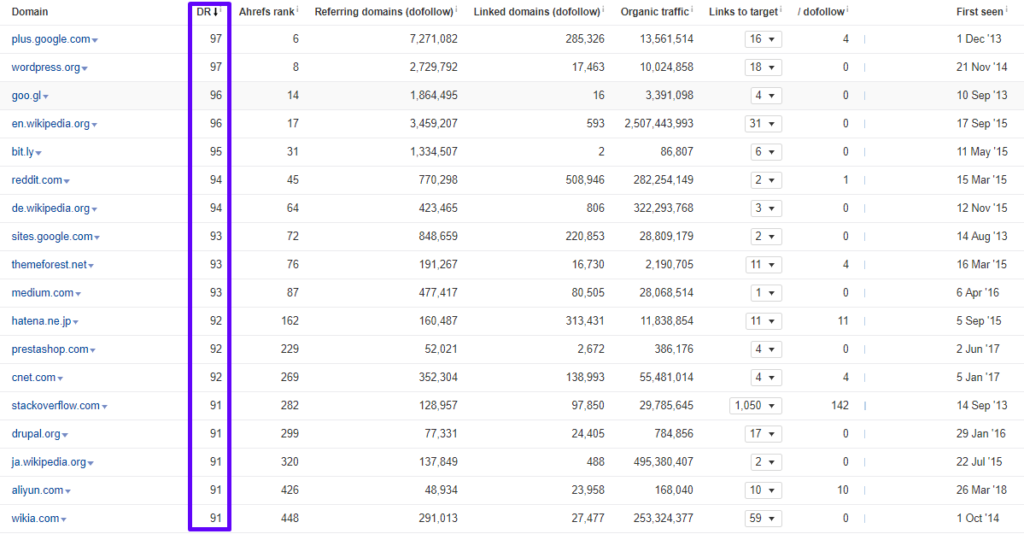
DHTML site JavaScript framework is mentioned 241 thousand times on different web pages.

JS Framework Ember.js

Ember.js appeared as a result of renaming SproutCore 2.0 in December 2011. The framework is mainly used to develop client components of web applications. Ember.js is solely for the front-end. It doesn’t cover server code, although it does support different methods of interaction with backends.
With Ember.js, you can create a fully functional application without any additional tools. However, it imposes quite strict requirements as to the code of a project, so it’s better to use this framework from the very start.
Ember JS popularity based on Google Trends data
The demand for Ember.js appeared immediately after its appearance in 2011. It reached the peak of popularity in 2017, after which the interest has started to decline.
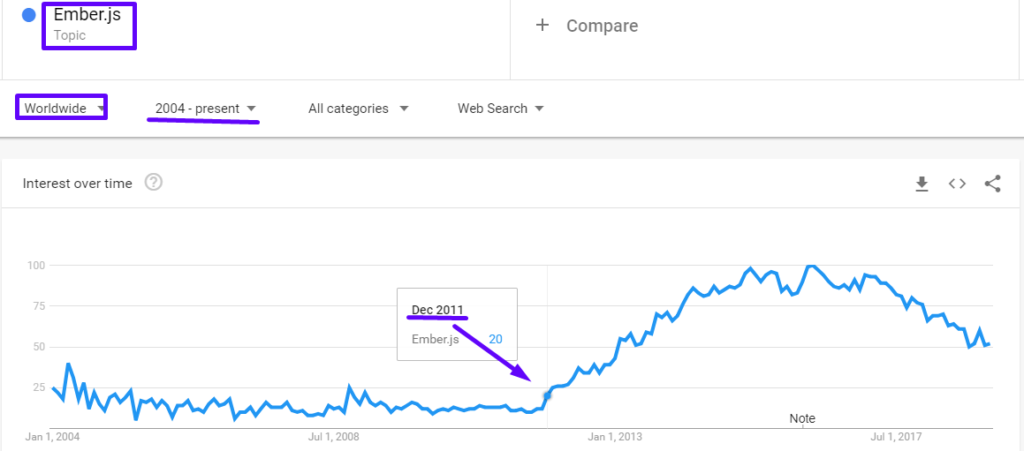
In the US, the downward popularity trend isn’t that noticeable. This is because Ember.js has remained popular for a long period.
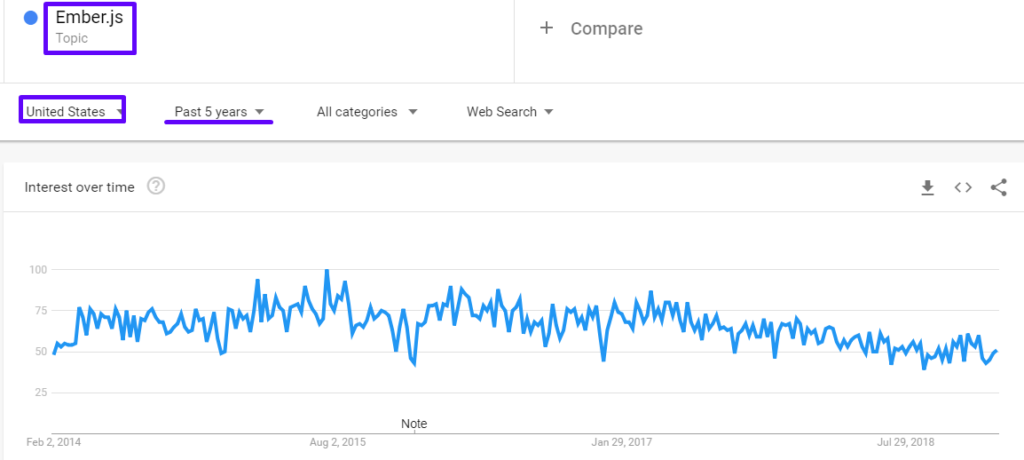
In India, the situation is similar to the US, but the popularity decrease is more rapid. Indian users expressed maximum interest in Ember.js in 2015 and 2016.
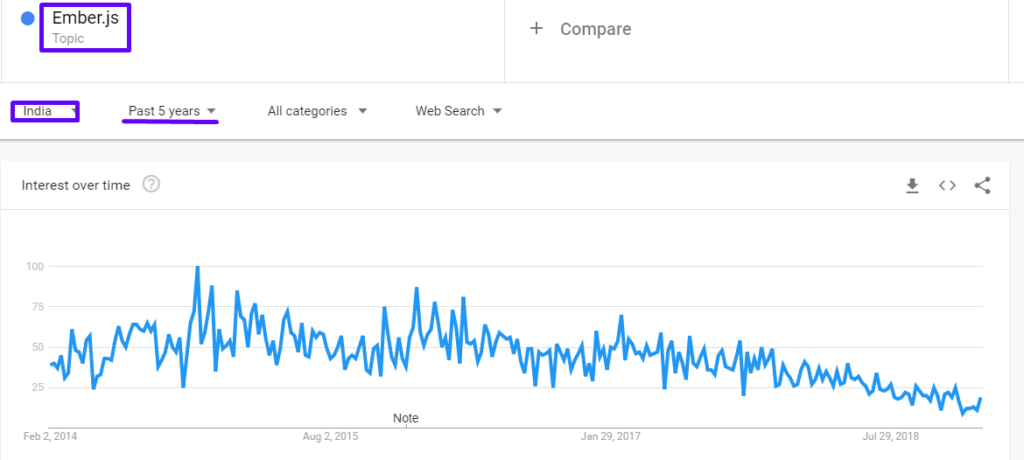
In the United Kingdom, Ember.js is still widely used. There is a popularity decline but very minor.
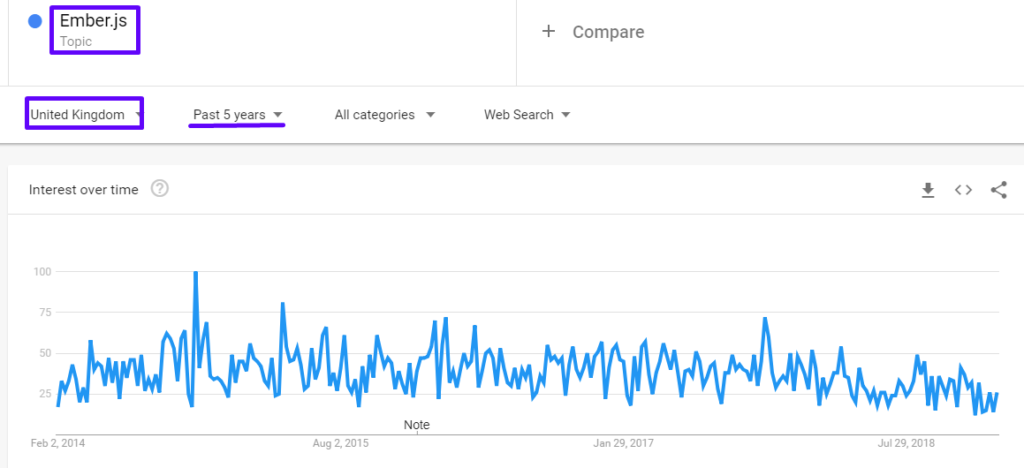
Keyword analysis based on Google Ads Keywords data
The statistics provided by Google shows that the interest in this JavaScript framework remains at the same level. The volume of keyword search almost hasn’t changed since 2015.
Besides, users have started to search for Ember.js on mobile devices more often.

This technology has the highest popularity among users from the United States (33.9%) and the United Kingdom (9.1%). The top 5 also include India (5.4%), Brazil (2.4%), and Japan (1.7%).

Linkbase and the number of references on the web
The website of Ember.js developers is linked by 890 domains and has 10,000 links in total. The dofollow links account for 82%.

Regarding referring domains, information portals and such services as linkedin.com, mozilla.org, reddit.com, medium.com have the highest domain rating.
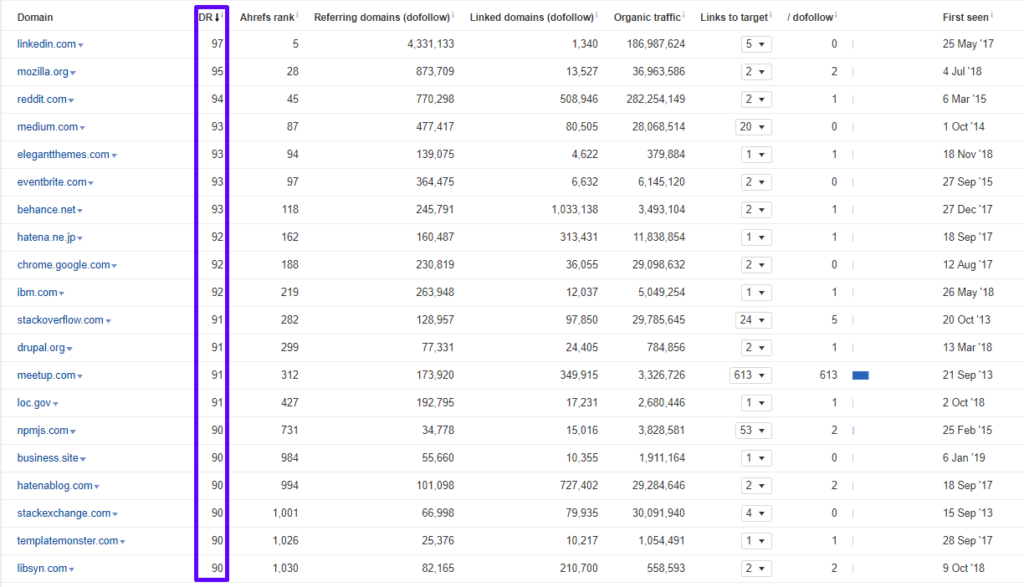
Ember.js framework was mentioned 2.68 million times online.

JS Framework jQuery

Released in 2006 by John Resig, JQuery initially was a library that remains popular despite its age. It has excellent cross-platform capabilities and allows developers to avoid adapting code to different browsers.
JQuery makes code more compact since one JQuery function can substitute several lines of code. This speeds up the coding process making it simpler and more convenient.
JQuery popularity based on Google Trends data
JQuery was gaining popularity from 2007 to the end of 2012. After that, the demand for the JavaScript framework has gradually started to decrease. The demand was still falling in 2020.
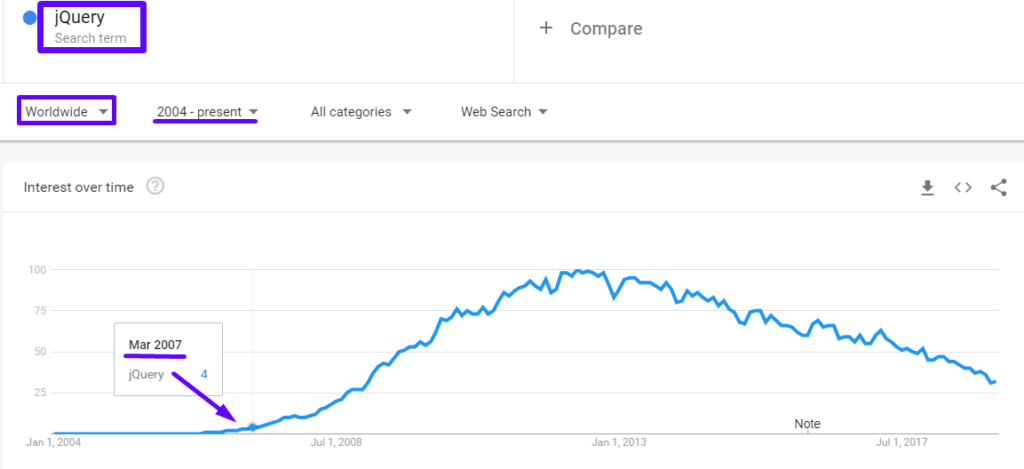
In the US, the interest in JQuery has been rapidly falling for the last 5 years.
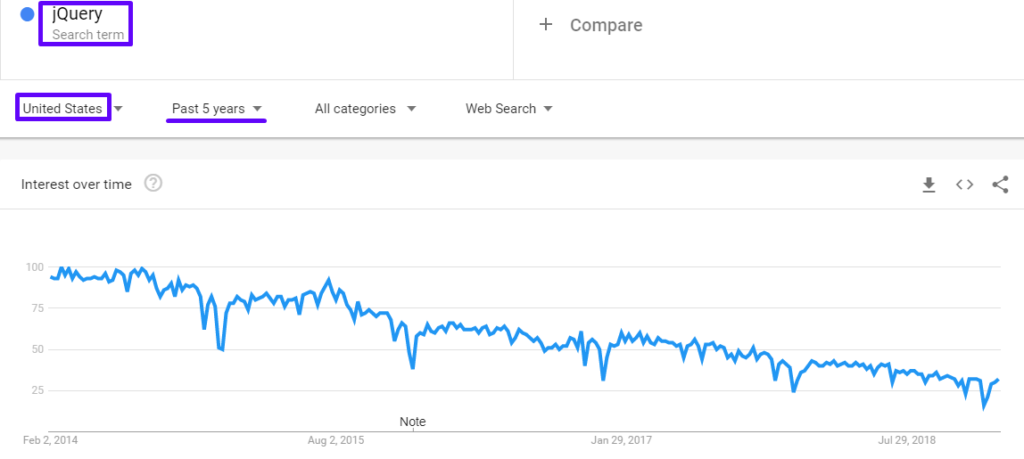
In India, the popularity of this framework has decreased by more than 4 times since 2014. The overall picture is similar to the US.
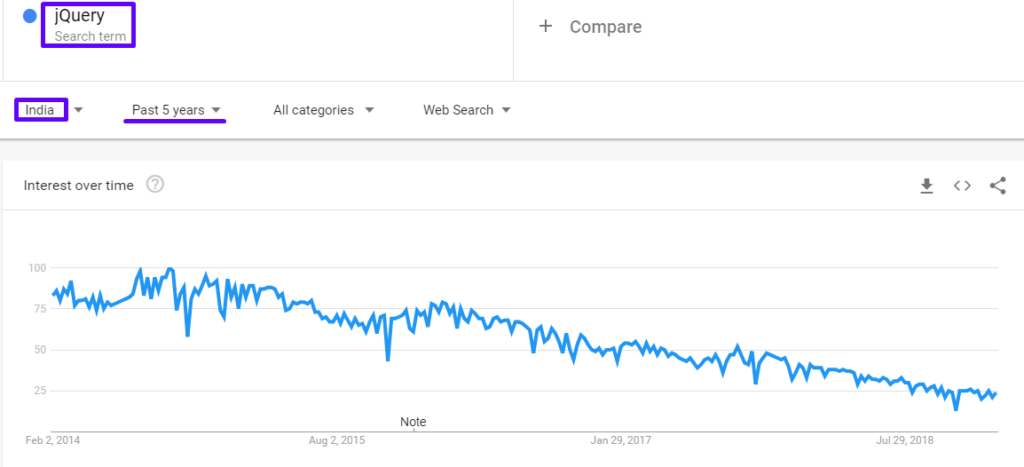
The United Kingdom shows the same trend. Again, we can see 2-year cycles of rapid decrease followed by equally rapid growth to average rates.
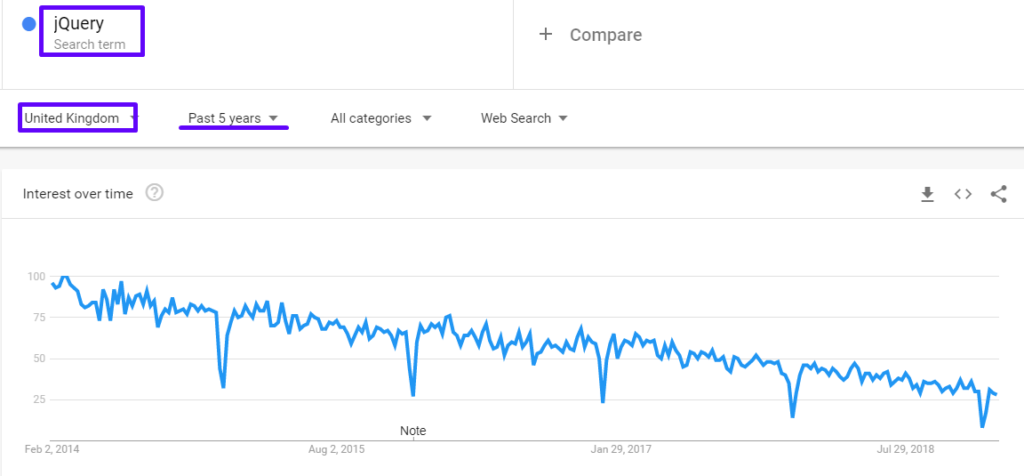
Keyword analysis based on Google Ads Keywords data
If you analyze the popularity of JQuery based on Google searches, there is only a minor downward trend. Users seem to become less interested in JQuery but not critically. The results for mobile users are repeatedly low.

Over the past 4 years, most of the key jQuery-related searches came from the US (15.1%), India (11.5%), Japan (6.5%), Germany (4.3%), and Brazil (3, 7%).

Linkbase and the number of references on the web
Links to the official jQuery website can be found on 68,079 domains. There are 32.6 million links totaled up with 87% dofollows.

As in the previous cases, the domain rating leaders include information platforms and various services.
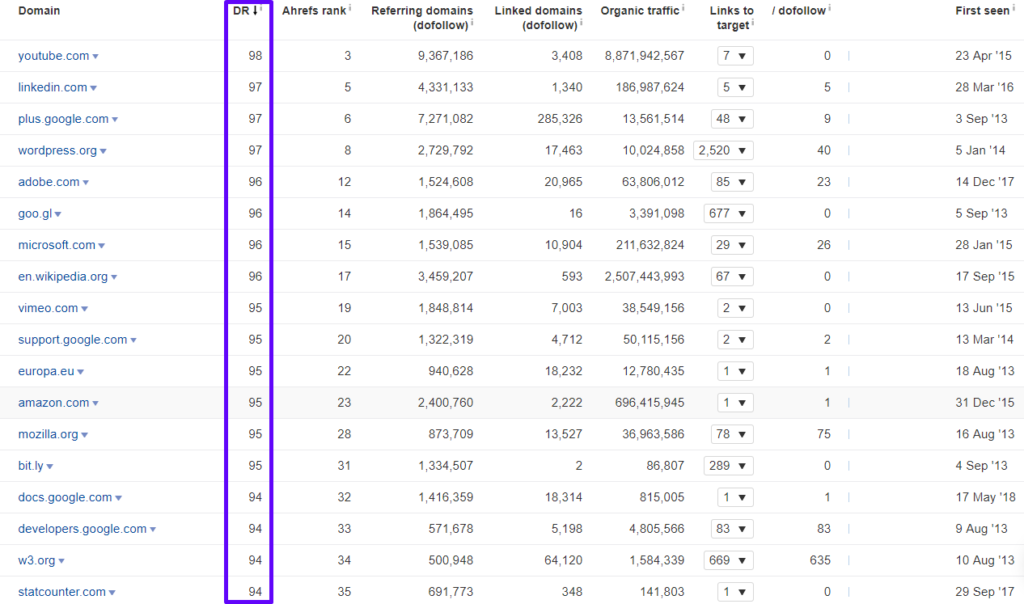
There are 158.82 million mentions of the jQuery framework online.

JS Framework KnockoutJS

Stephen Sanderson developed this JavaScript framework from Microsoft. Knockout JS is in many respects similar to Angular JS. They have the same ideology, and both are used to create dynamic web applications. However, knockout JS extends the HTML syntax and allows the creative brief and succinct descriptions for the developed app. The library was released in 2010.
Its key feature is interfaced change tracking and automatic synchronization of the data source in case of changes.
Knockout JS popularity based on Google Trends data
Knockout JS started to gain popularity in 2011. It reached its peak in 2014 with a subsequent gradual decrease in interest.
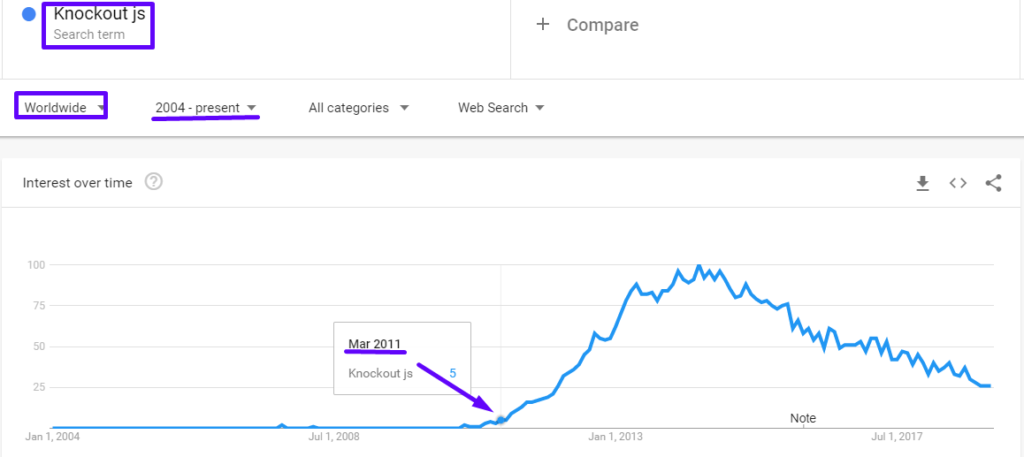
In the US, the interest in Knockout JS was rapidly falling until 2016. However, after that, the declining trend has slowed down.
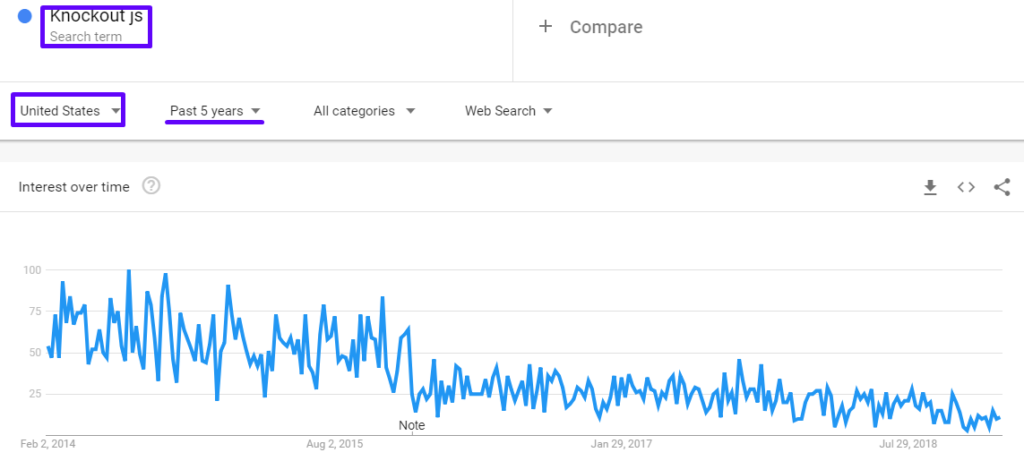
In India, the interest in Knockout JS has been slowly decreasing over the last 5 years.
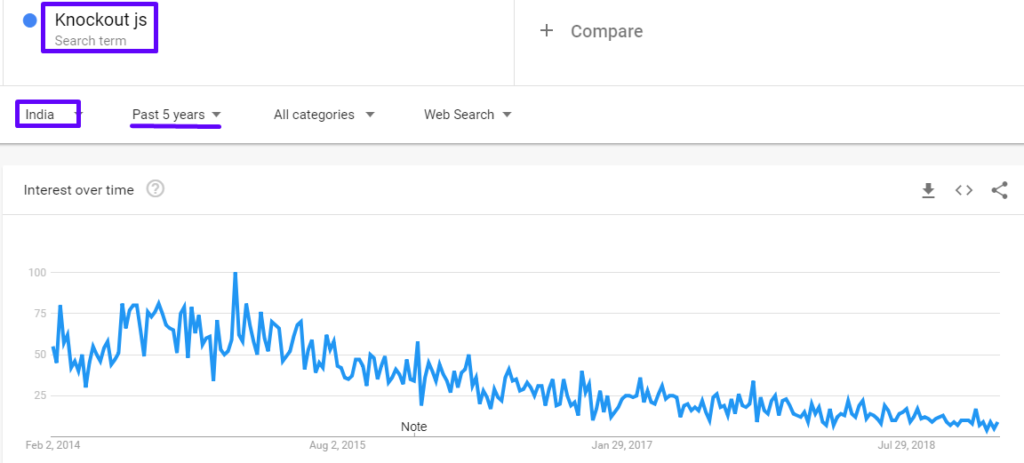
The United Kingdom shows the same dynamics with the splashes of interest in Knockout JS.
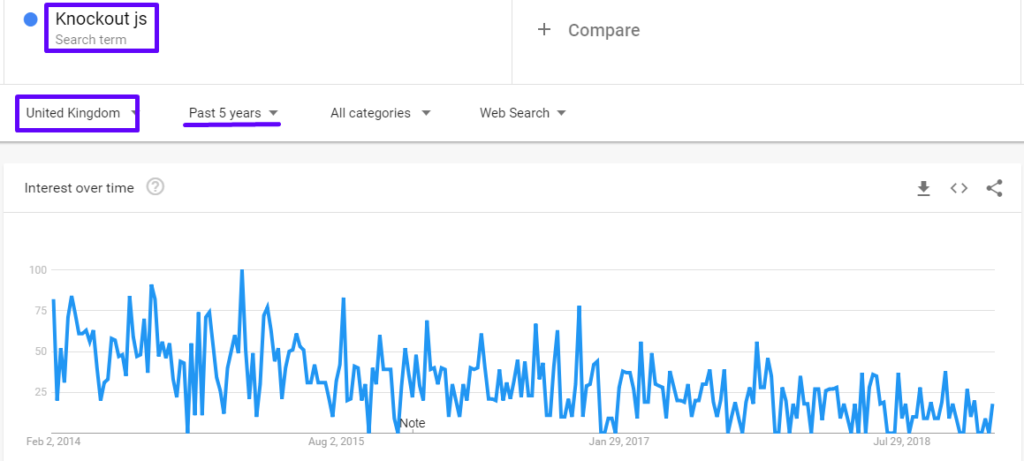
Keyword analysis based on Google Ads Keywords data
Google Search statistics on the volume of Knockout JS searches since 2015 shows a slight decrease in the interest in the JavaScript framework. The average rates have dropped but not drastically.
Speaking of mobile devices, the situation is different. The popularity of Knockout JS among mobile users seems to grow.

Users from the US (21.9%), India (9.4%), Brazil (3.4%), Japan (3.2%), and Germany (3.2%) lead in the number of Knockout JS searches.

Linkbase and the number of references on the web
In total, 4082 domains link to the website of Knockout JS framework developers. They locate 130 thousand links, 84% of which are dofollows.

wordpress.org, adobe.com, goo.gl, microsoft.com, and other information portals and various services have the highest domain rating.
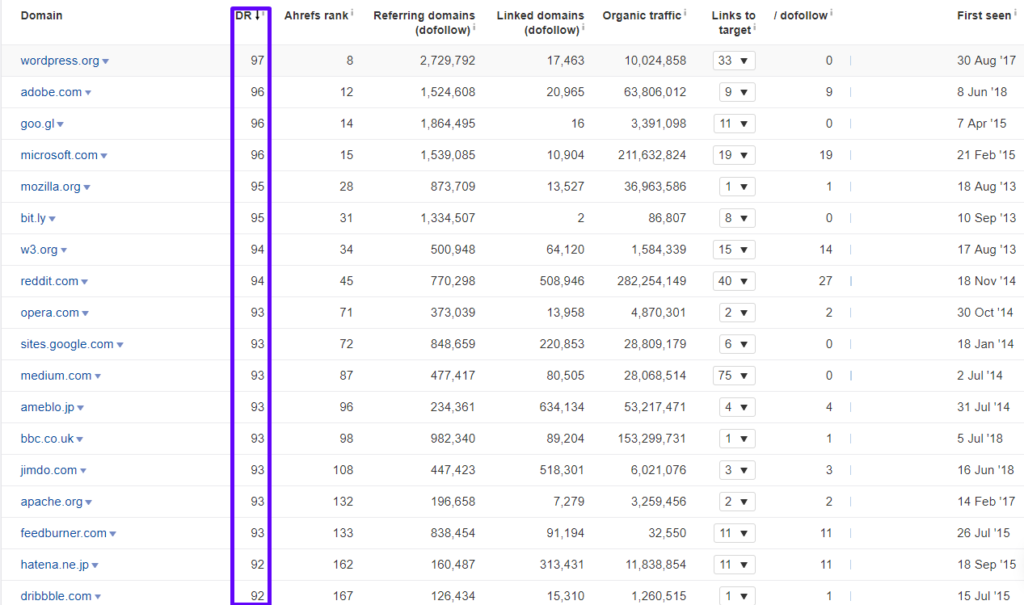
KnockoutJS is mentioned ~2,32 million times on the web.

JS Framework Meteor.js

Released in 2011, Meteor JS immediately attracted the attention of investors and gained popularity after the launch. It was originally called Skybreak and renamed Meteor only in 2012.
This framework can be considered as a comprehensive platform for modular client-server application development. This is because it’s one of its key features – the same code is used on the client- and server-side.
Meteor JS popularity based on Google Trends data
In 2012, Meteor JS started to gain popularity rapidly. Having reached its peak in 2016, the interest in this technology has begun to fall. The decline was pretty sharp.
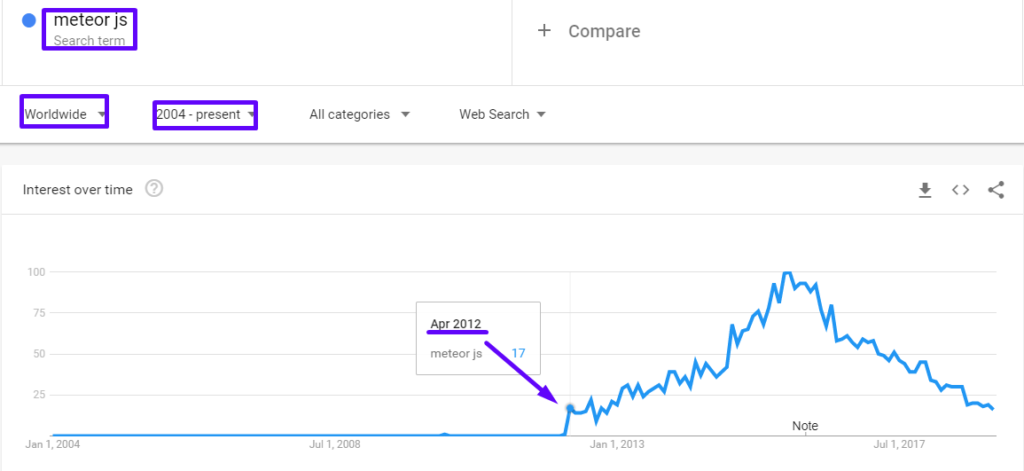
In the US, Meteor JS had maximum popularity during 2015. However, in 2016, the demand for this JavaScript framework lowered, preserving the downward trend.
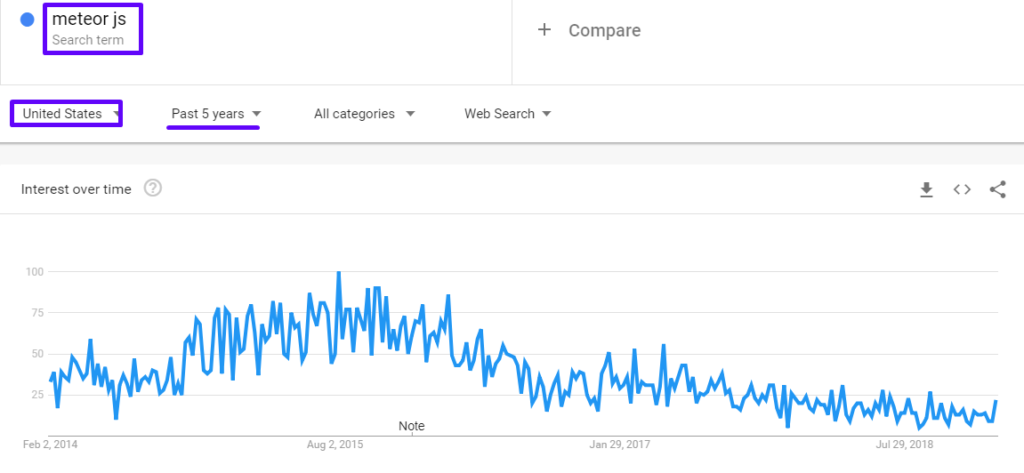
In India, the popularity of the framework was also rapidly growing in 2015. Yet, it was a short-term trend, and in 2016, the situation stabilized. However, since then, the interest in Meteor JS has been steadily decreasing.
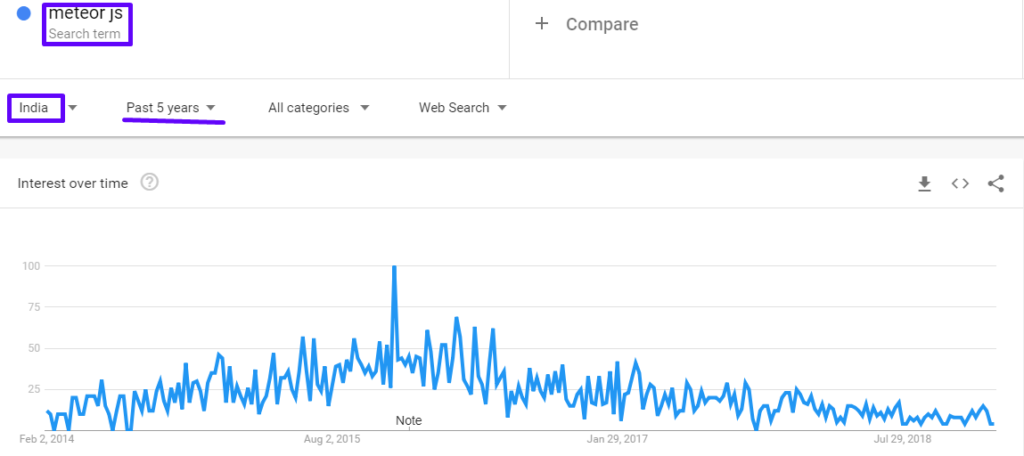
In the United Kingdom, the decline wasn’t that dramatic, but the average rates have also decreased.
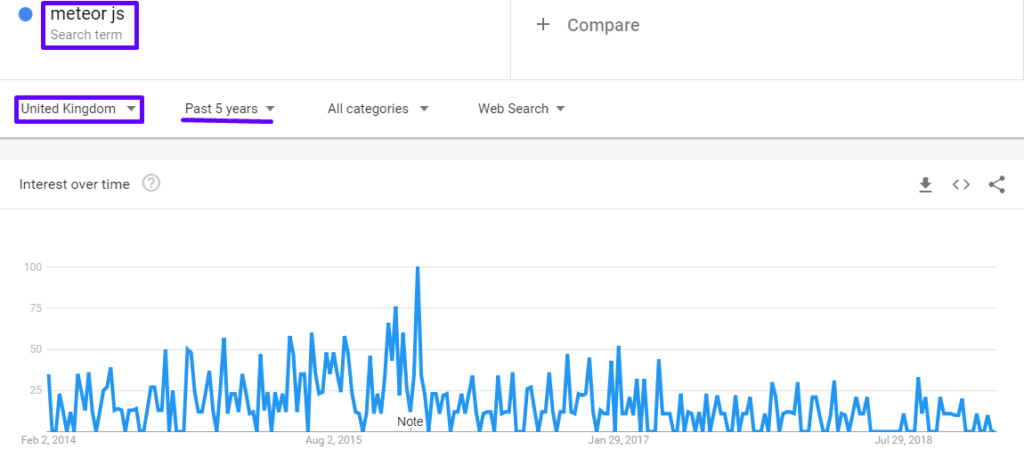
Keyword analysis based on Google Ads Keywords data
Since 2015, the volume of Meteor JS searches has been decreasing. Below, you can check Google’s statistics to see the negative dynamics. On mobile devices, the interest in Meteor JS remains at the same level as in 2015.

As to the number of search queries in Google, the United States (17.1%), Turkey (7.5%), India (3.9%), Great Britain (3.6%), and France (2.2%) are taking the lead.

Linkbase and the number of references on the web
4,824 domains are linking to Meteor JS website. They have 64,700 links in total with 78% of dofollow links.

Out of them, information portals and services have the highest domain rating.
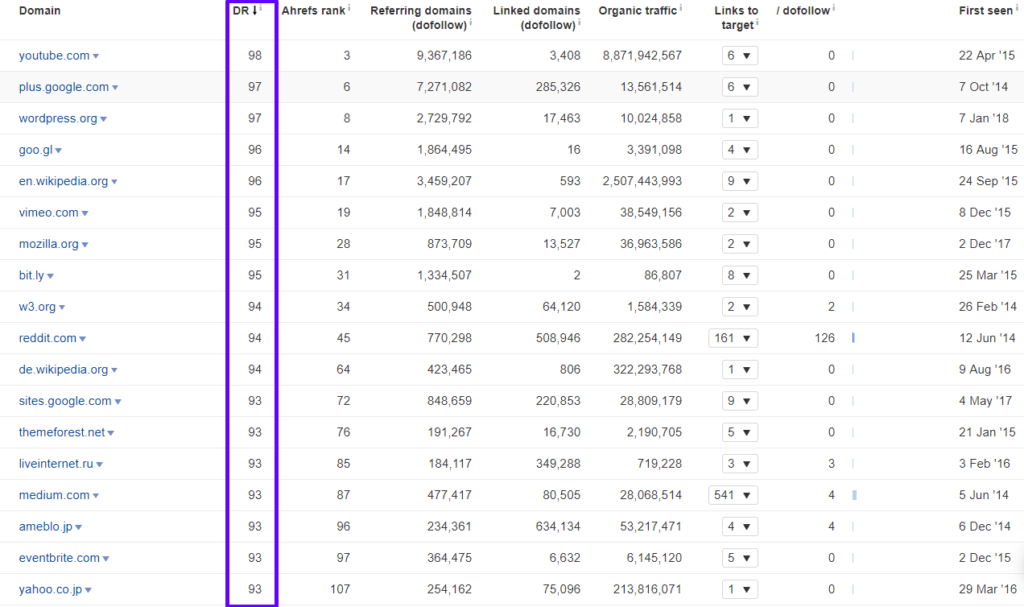
Meteor JS framework was mentioned 356,000 times online.

JS Framework Node.js

Ryan Dahl developed this JavaScript framework in 2009. Although Node JS is mostly used as a web server, it has much broader capabilities. It is suitable to develop simple windowed applications and sometimes to program microcontrollers.
Node JS runs on the V8 engine, which is also used in Google Chrome. Compared to other server platforms, Node JS is easy to learn. Developers won’t need to master a new tool for server development. JS code seamlessly runs in the Node JS environment. Its speed is another benefit. The code executed in the Node JS environment is much faster than its Java, C, Python, or Ruby counterpart.
Node JS popularity based on Google Trends data
Since 2009, Node JS was quickly gaining popularity until a minor decline that started in mid-2017. This decrease isn’t critical since developers are still interested in Node JS.
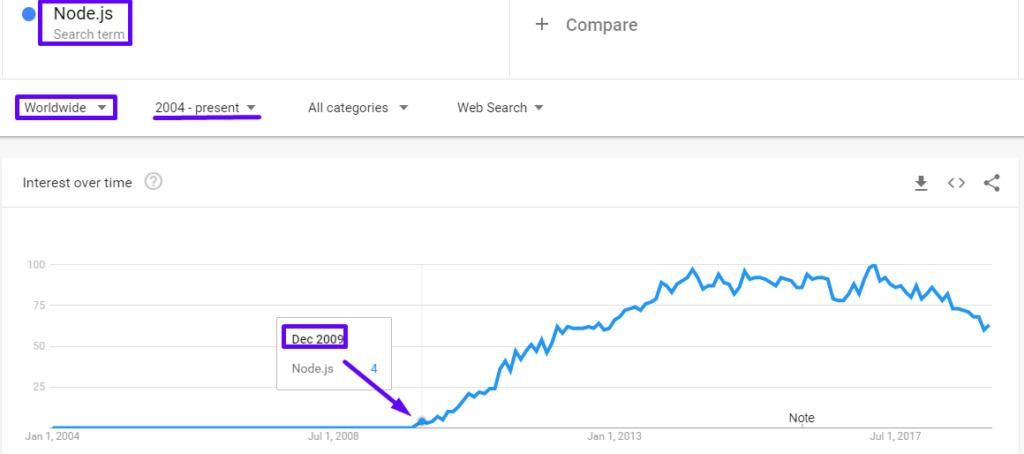
The US statistics show a slight decrease in the interest in NodeJS since 2014.
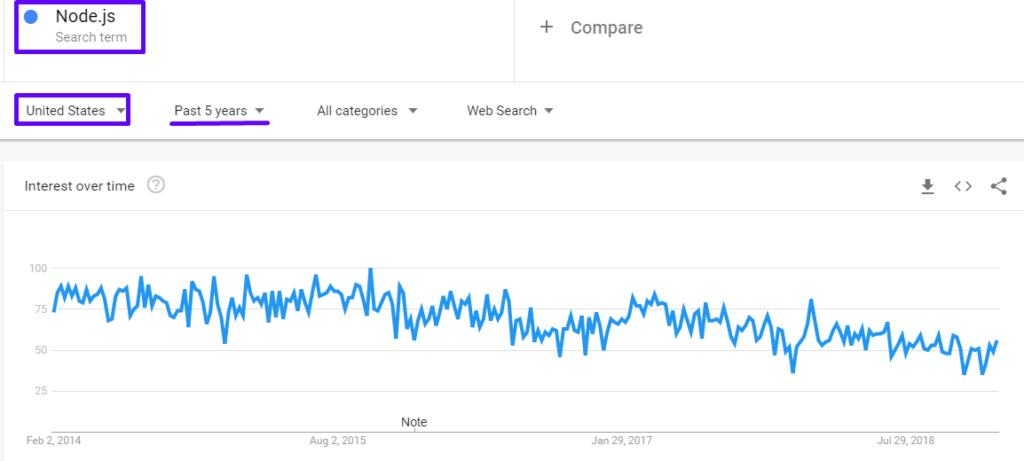
There is a similar situation in India. Here Node JS reached its peak in 2015.
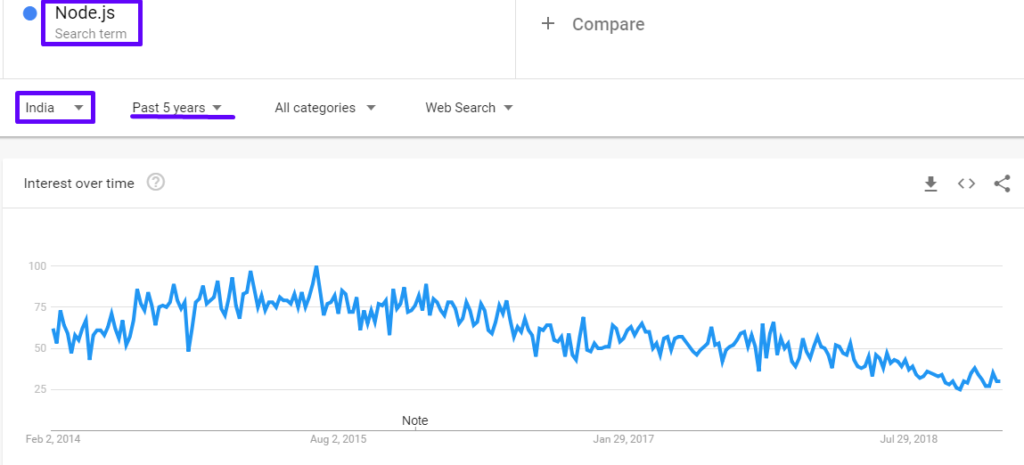
In the United Kingdom, a minor decline in Node JS’s popularity happened only in 2018. Before that, the developers’ interest in the framework remained at the same level.
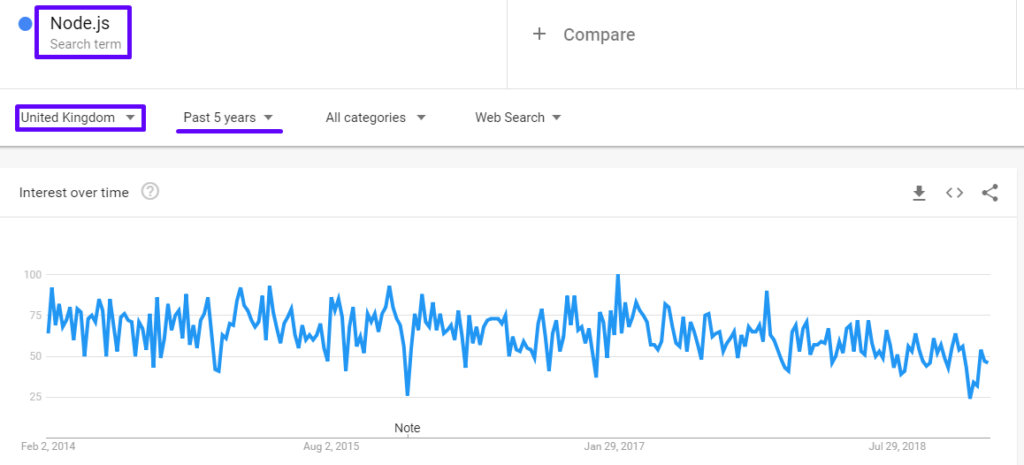
Keyword analysis based on Google Ads Keywords data
The volume of Node JS searches in Google over the past 4 years shows a stable increase in the developers’ interest. Moreover, mobile searches are also growing.

The largest numbers of keyword searches come from the US (22.0%), India (13.1%), Japan (4.0%), Germany (4.0%), and Brazil (3.2%).

Linkbase and the number of references on the web
Node JS website is referenced by 41,266 domains with up to 2.5 million links. Out of them, dofollow links comprise 89%.
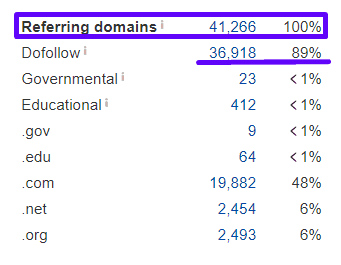
youtube.com, linkedin.com, wordpress.org, and other information portals have the highest domain rating.
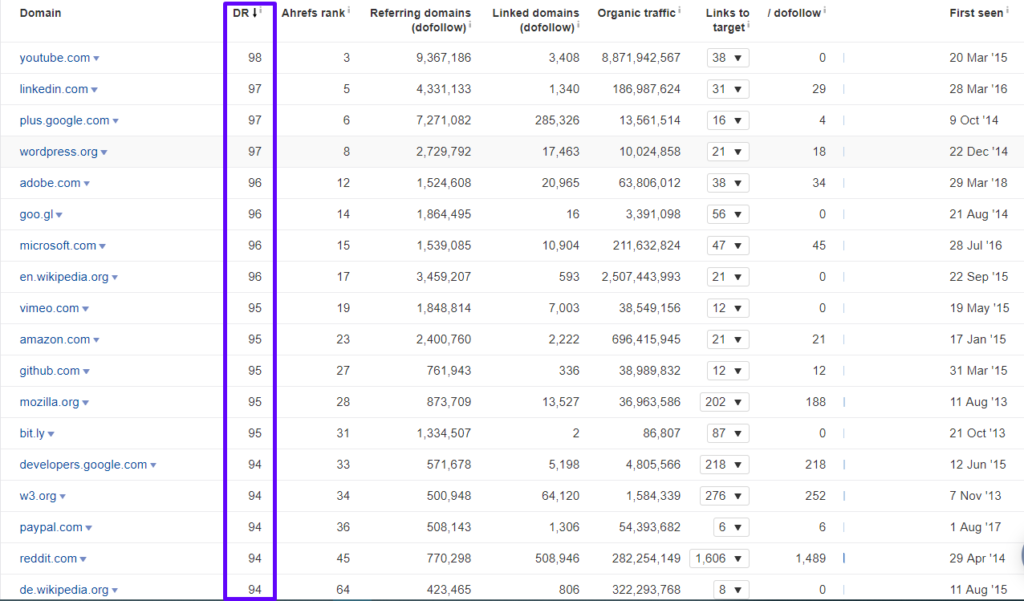
There are ~32.1 mentions of Node JS on the web.

JS Framework Polymer.js

Created as a JS library, Polymer is currently supported by Google and GitHub contributors. In addition, the development of Polymer JS is closely tied to the development of Google Chrome. This browser ensures high performance and proper work of the library.
Polymer JS made standard web components available for all browsers. So regardless of the implementation of web components specification in a browser, thanks to Polymer JS, the library and components will work in the same way.
Besides, Polymer has a complex syntax, so JavaScript beginners will need more time to learn it.
Polymer JS popularity based on Google Trends data
We can notice an abrupt increase in Polymer JS’s popularity in 2013, which hasn’t continued for a long time. Over the next few years, the interest in this technology was falling. This indicates the low Polymer JS prevalence and marketing flaws.
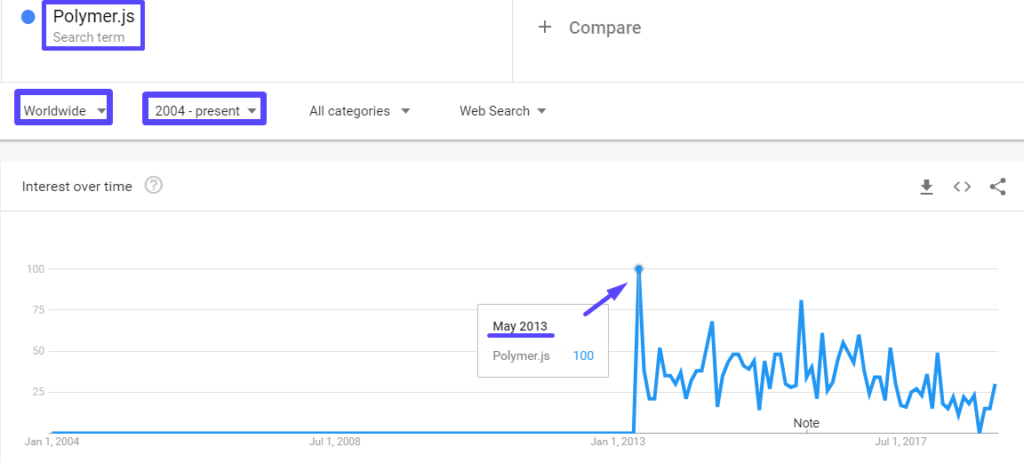
In the US, the periods of growth were recorded until 2015. But, then, the demand for JavaScript framework considerably declined.
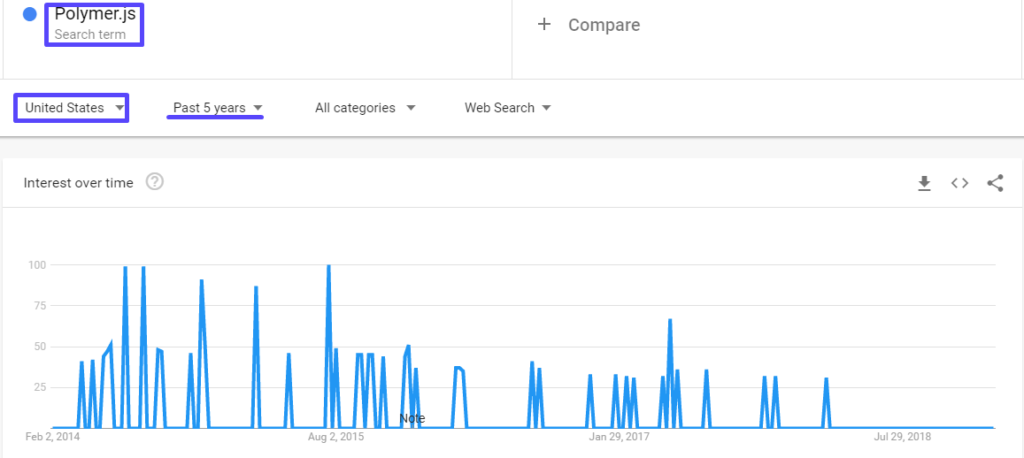
In India, a growth and decline cycle looks less sharp. The interest decrease isn’t as drastic as in the US.
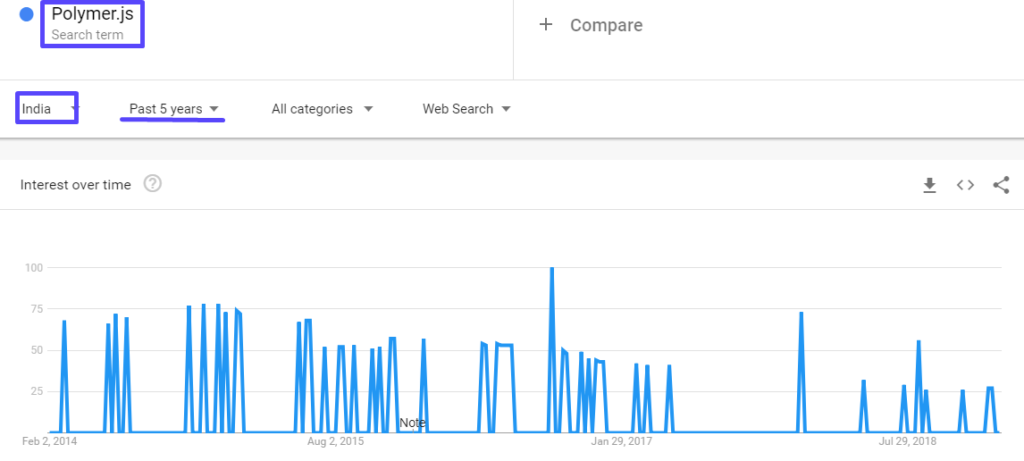
In the United Kingdom, the interest in Polymer JS is so low that there is no statistic available.
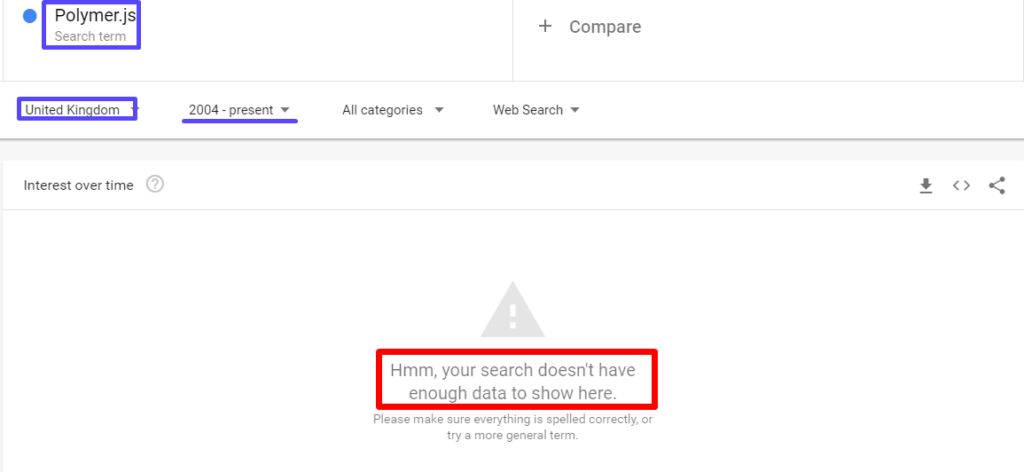
Keyword analysis based on Google Ads Keywords data
The 4-year statistics on the volume of Polymer JS searches in Google shows that this Google’s framework has always attracted user interest. There was a slight increase in the demand in 2016, but after that, the popularity returned to the previous rates.

Most Polymer JS requests belong to users from the United States (23.4%), India (20.1%), Great Britain (4.1%), Germany (3.9%), and Canada (2.8%).

Linkbase and the number of references on the web
Links to the main Polymer JS website can be found on 4,137 domains. The total number of links reaches 75300, with 84% of dofollows.

Again, information platforms and services have the highest domain rating.
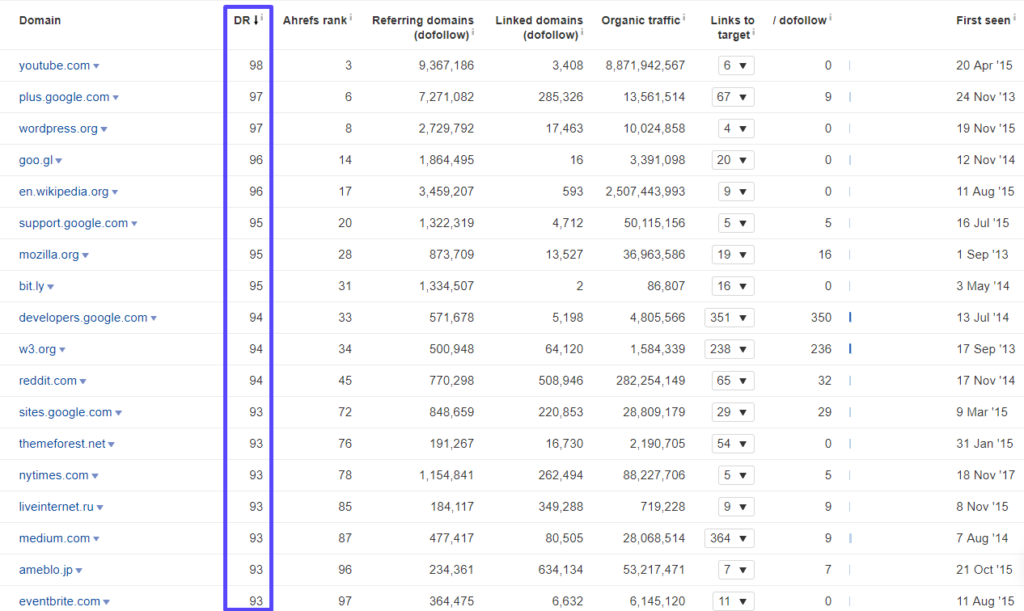
PolymerJS framework is mentioned ~ 29,900 times on the web, quite a modest result.

JS Framework PureMVC

PureMVC JavaScript framework is based on design patterns. It was created to develop high-performance RIA clients. The main goal of PureMVC is to divide the interests of the generated code into levels – Model, View, and Controller. This is necessary to design scalable and productive applications.
PureMVC popularity based on Google Trends data
This JavaScript framework started to gain popularity and developers’ interest in 2007. After its peak in the summer of 2008, the demand for the framework began to decline. Since 2010, the downwards tendency has even strengthened. In 2020, the demand for PureMVC almost reached the bottom line.
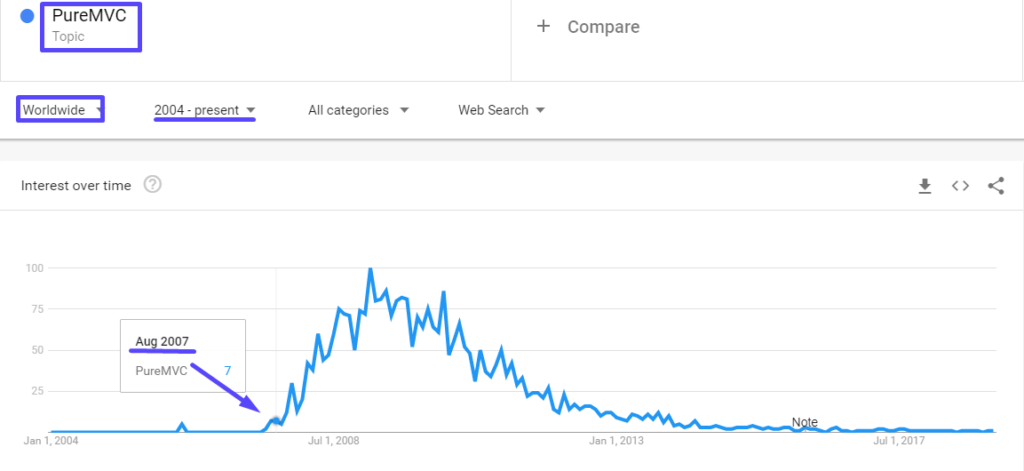
In the US, the demand for PureMVC was growing for some time. Yet after that, developers started to use it less often, and now its popularity is low.
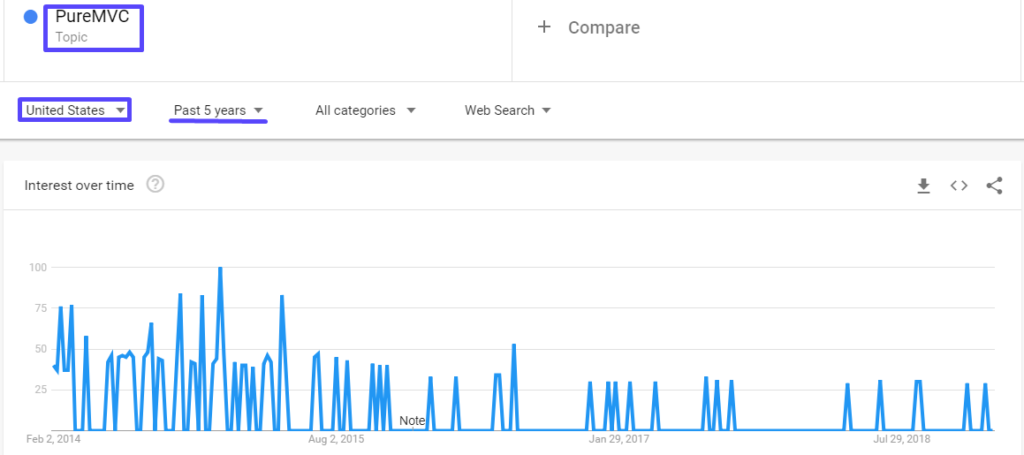
The statistics on India almost duplicates the US.
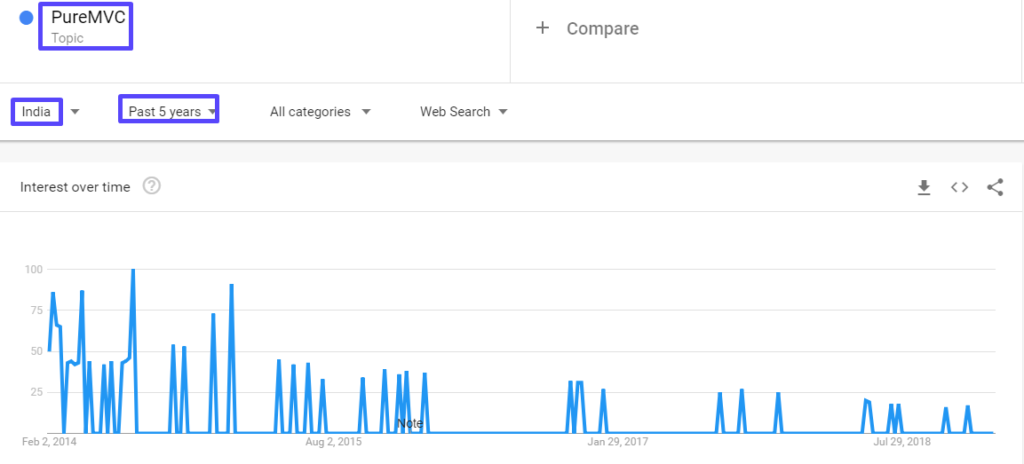
In the United Kingdom, PureMVC has had low popularity for the past five years. It has fluctuated from zero to minimum values.
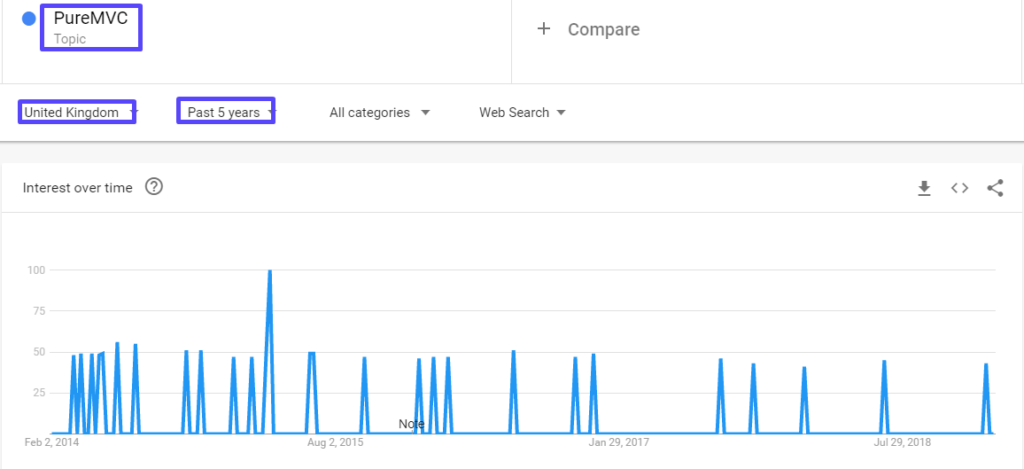
Keyword analysis based on Google Ads Keywords data
The volume of search requests in Google also shows that PureMVC has become less popular. There were two peaks in 2015 and 2017 with a subsequent decline in both cases. The statistics on mobile devices is similar.

The United States (13.3%), India (11.8%), Japan (6.8%), Great Britain (4.3%), and Brazil (2.1%) have made the majority of PureMVC search requests.

Linkbase and the number of references on the web
4.8 thousand links to the official PureMVC website are located on 619 domains. 78% of these links are dofollow.

The highest domain rating is observed among information platforms and various services.
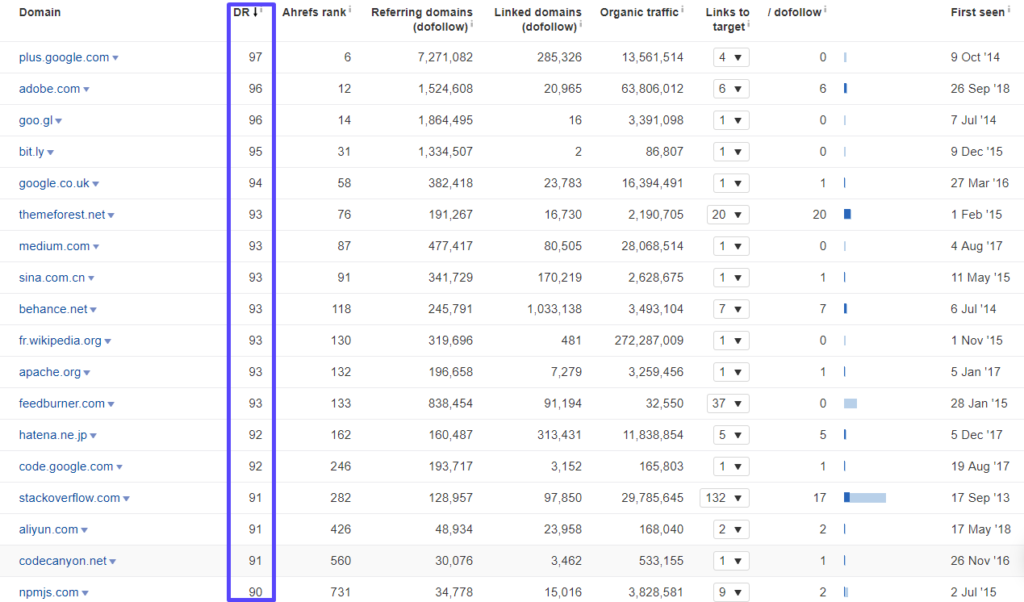
There are ~69 200 mentions of PureMVC on the web.

JS Framework qooxdoo

Qooxdoo framework is suitable for cross-browser, multifunctional applications. Its developers claim that you won’t need CSS, HTML, and DOM expertise. The framework has an object-oriented architecture and works with all modern browsers.
Qooxdoo popularity based on Google Trends data
Qooxdoo has started to become trendy in 2005, reaching its peak in 2008. Since 2009, Qooxdoo’s popularity has been declining. In 2020, there is almost no interest in this technology.
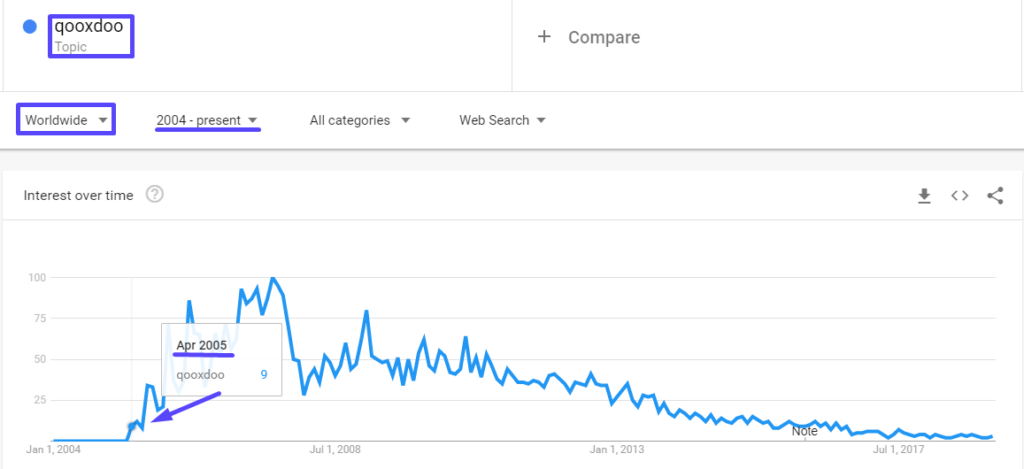
In the US, interest in Qooxdoo also slightly increased in 2014. Yet generally, there is an obvious downward trend.
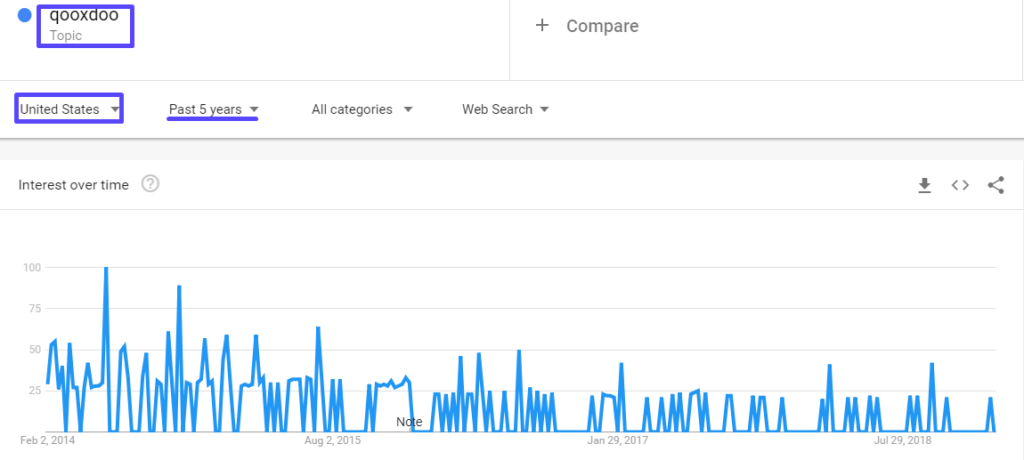
The same thing in India. The demand for the Qooxdoo framework slightly grew in 2014-2015, but it has almost reached zero after that.
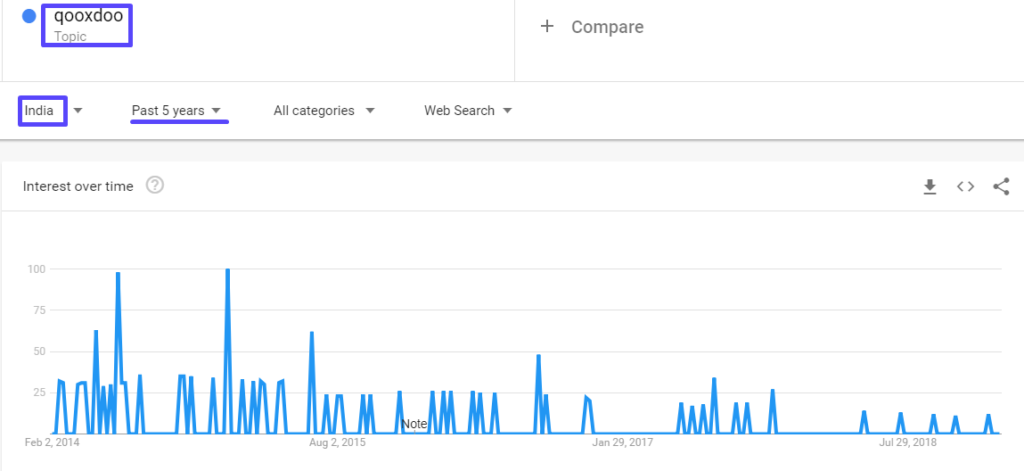
In the United Kingdom, Qooxdoo is rarely used. Since 2014, it has been mentioned only a few times.
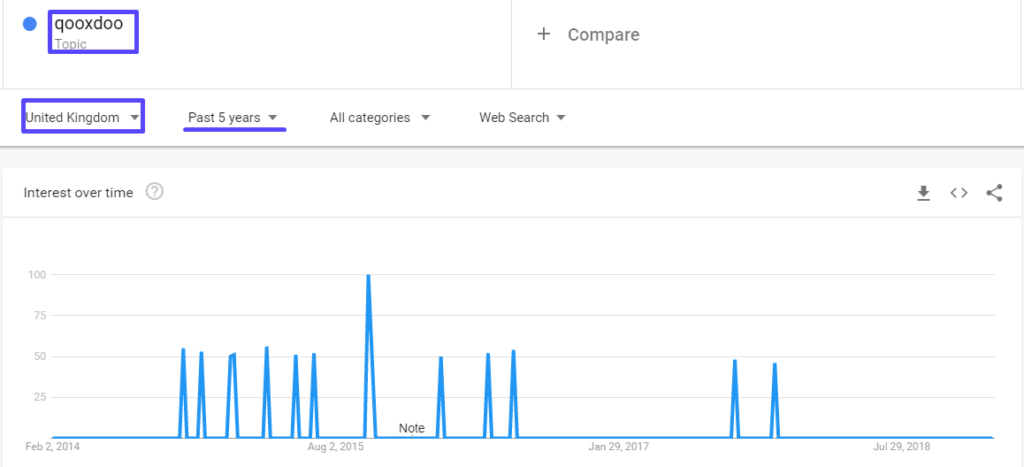
Keyword analysis based on Google Ads Keywords data
The search volume analysis shows that Qooxdoo has been steadily becoming less popular since 2015. The interest is gradually reaching zero.

The majority of Qooxdoo searches belong to the United States (9.7%), France (7.4%), India (3.6%), the United Kingdom (2.9%), and Japan (2.5%).

Linkbase and the number of references on the web
In general, official Qooxdoo website is referenced by 1427 domains with14400 links. Out of this number, 77% of links are dofollow.

In terms of domain rating, information portals take the lead.
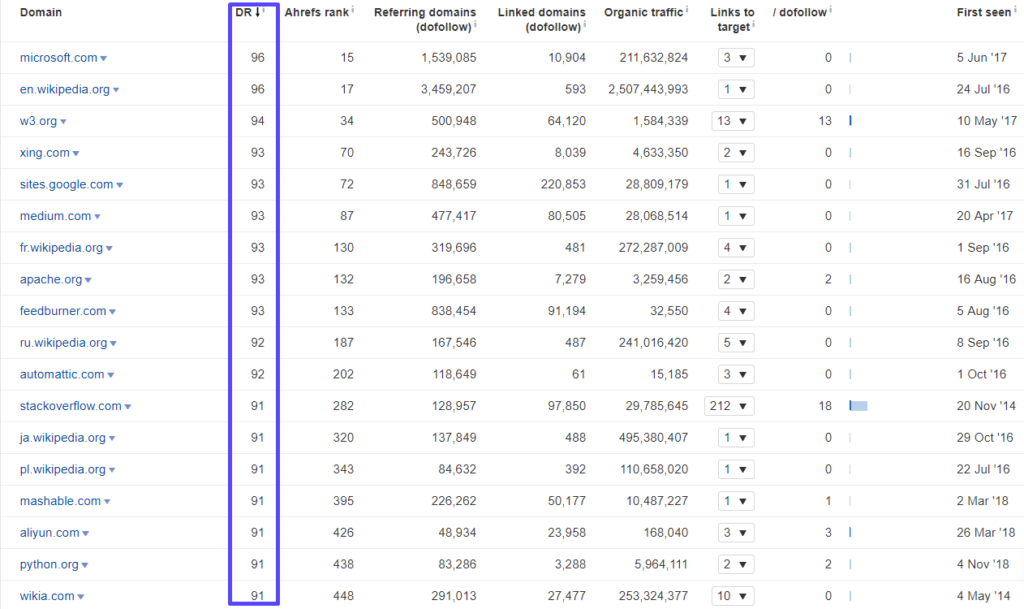
Qooxdoo search request generates 102,000 web results.

JS Framework React.js

React JS framework was created by a Facebook employee, Jordan Walke. Among its key features, it’s worth mentioning one-way data transfer, the use of virtual DOM and JSX, which extends the syntax of standard JS. ReactJS function isn’t limited to rendering HTML in a browser. There will be no problems with mobile devices.
In 2020, React JS remained one of the most popular frameworks.
React JS popularity based on Google Trends data
The interest in React JS has started to increase in 2014 and continues to this day.
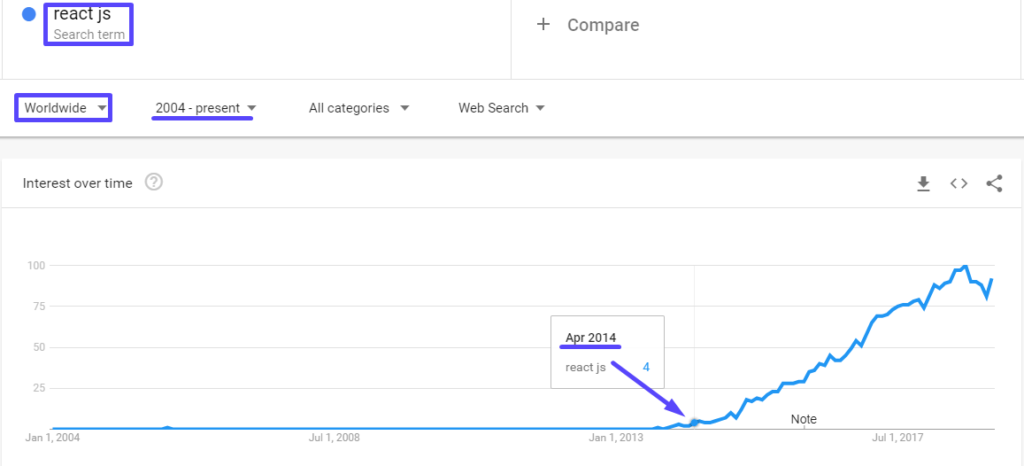
In the United States, the demand for React JS has increased several times since 2014. After a slight decline in 2018, the growth continued.
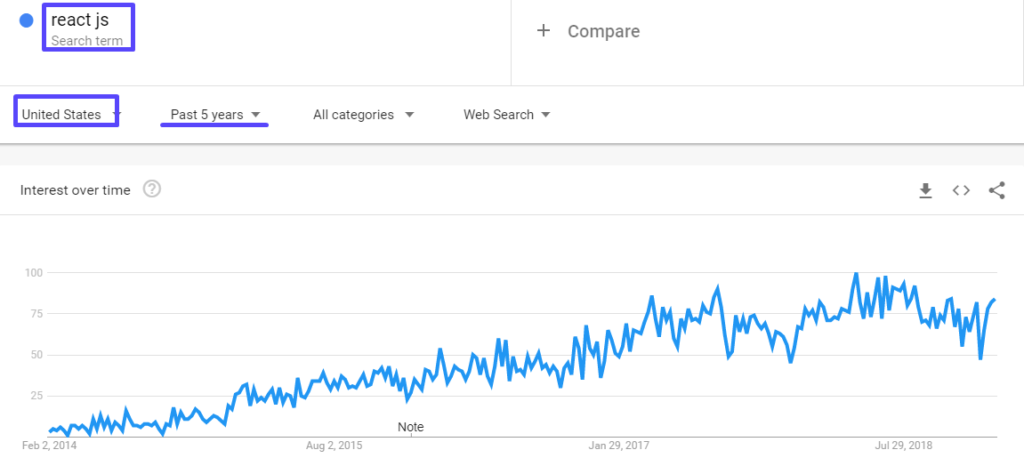
In India, the trend is pretty similar. The only difference is that React JS has gained popularity a bit later.
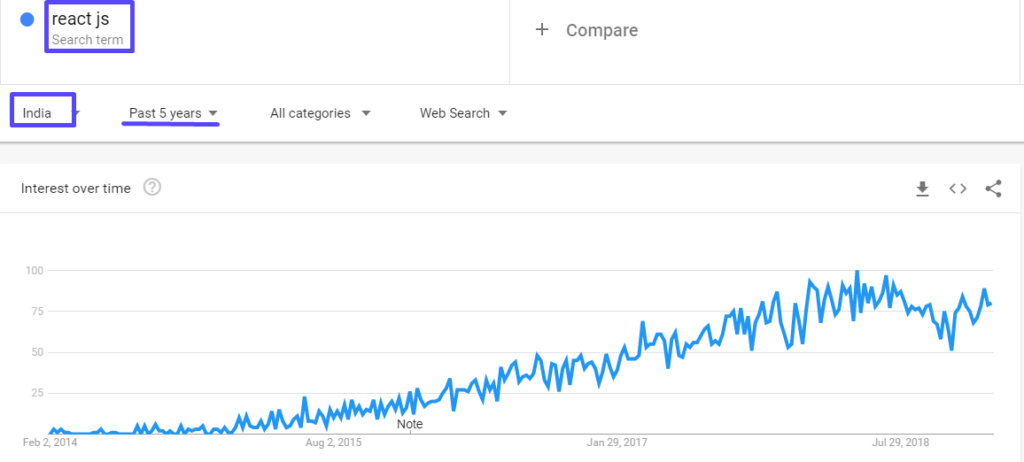
In the United Kingdom, growth has started around the same period as in India.
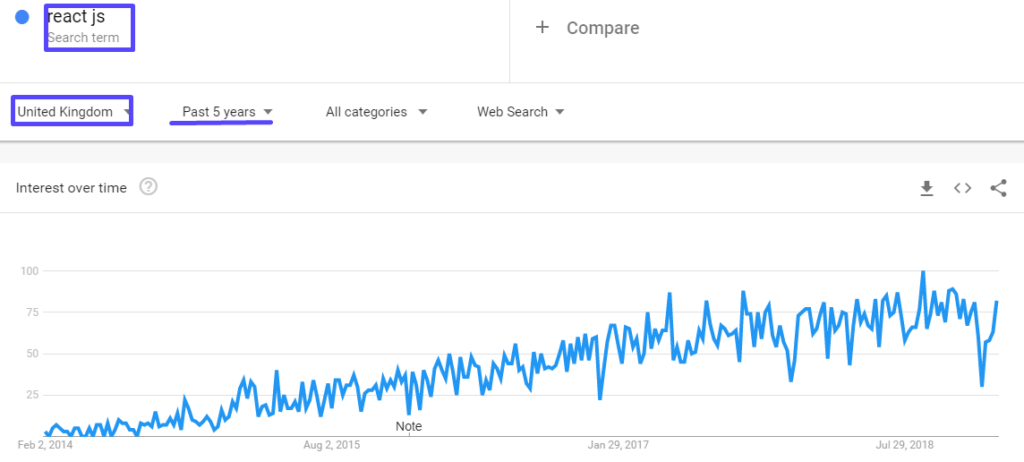
Keyword analysis based on Google Ads Keywords data
The analysis of React JS search volume in Google shows that the interest in the framework increased in 2015. The rapid growth continued until 2017 when the popularity stabilized.

The United States (21.9%), India (17.3%), Great Britain (4.3%), France (3.3%), and Brazil (2.1%) have done the most searches.

Linkbase and the number of references on the web
There are 621000 links to the website of React JS creators from 15425 domains. Out of this number, 90% are dofollow.

If we rank these resources by domain rating, we’ll see that the top results comprise information portals, services, and social media.
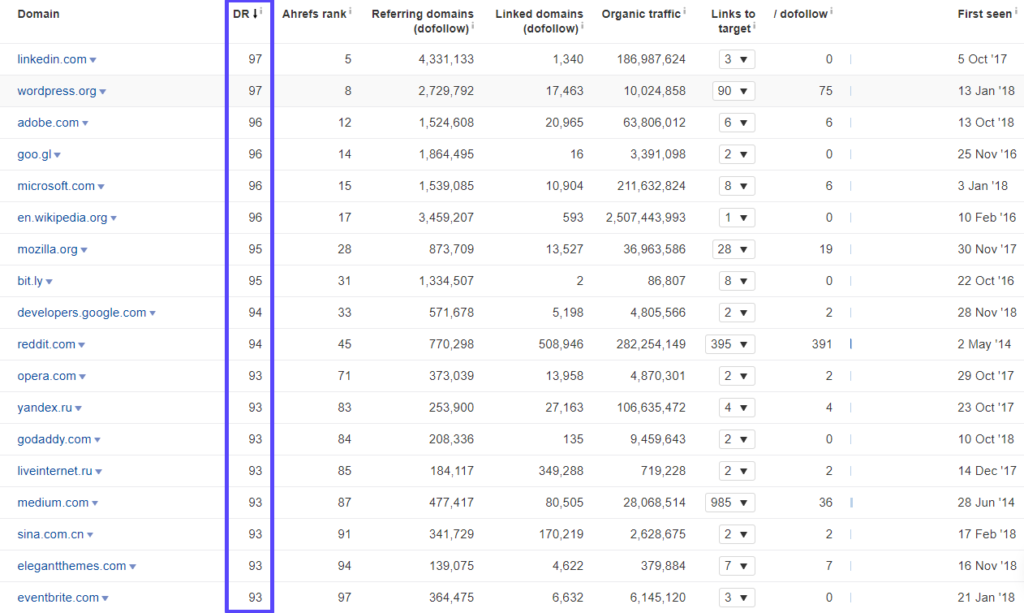
There are ~6,480,000 mentions of React JS on the web.

JS Framework Sencha Ext JS

Sencha Ext JS was initially created as a library that expands the capabilities of Yahoo! UI Library. Later it evolved into a JavaScript framework. As a result, Sencha Ext JS is suitable for creating cross-platform web applications and user applications. In addition, it seamlessly supports various browsers.
Besides, Sencha Ext JS has many UI widgets, configurable UI, customized themes, and data packets independent of the backend.
Sencha Ext JS popularity based on Google Trends data
In 2010, Sencha Ext JS became popular and demanded. By the beginning of 2013, the demand for Sencha Ext JS reached its maximum and started to decrease. The downward trend was still present in 2020.
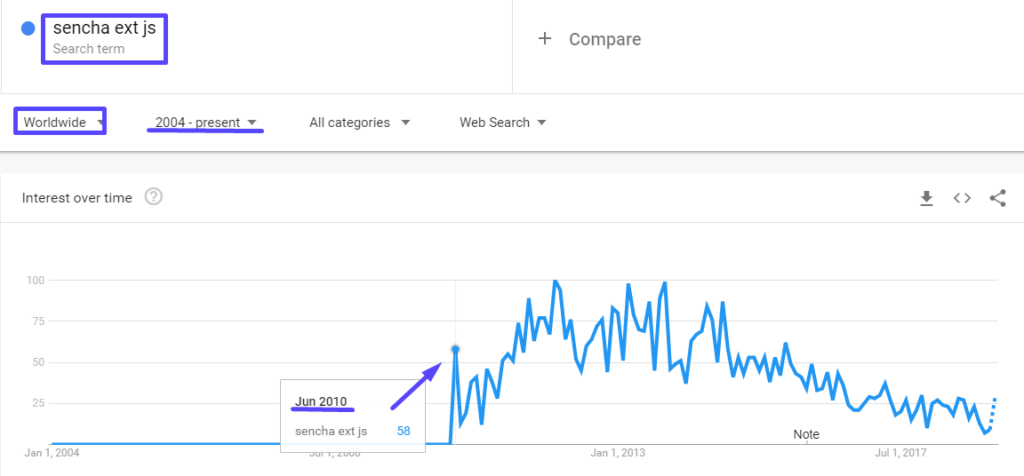
In the US, the interest in the Sencha Ext JS framework has been steadily reducing since 2014.
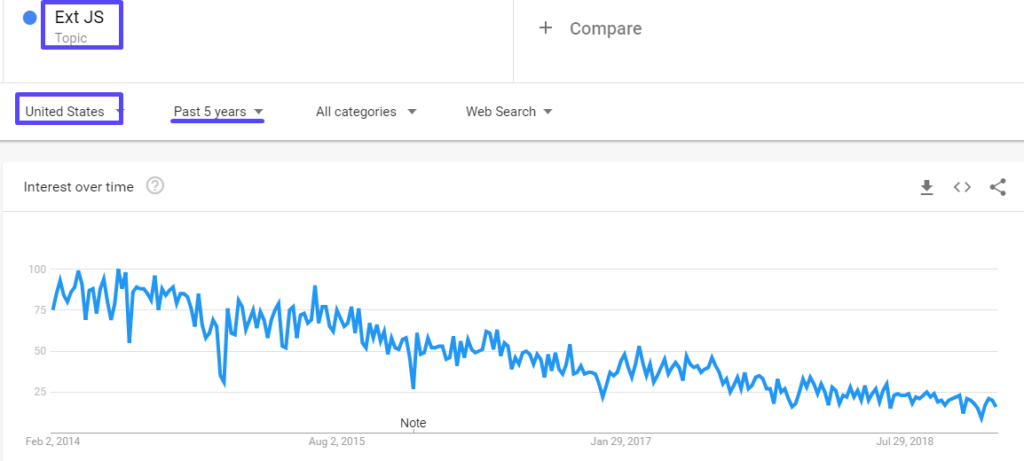
India has similar dynamics. Since 2014, Sencha Ext JS has been becoming less and less popular.
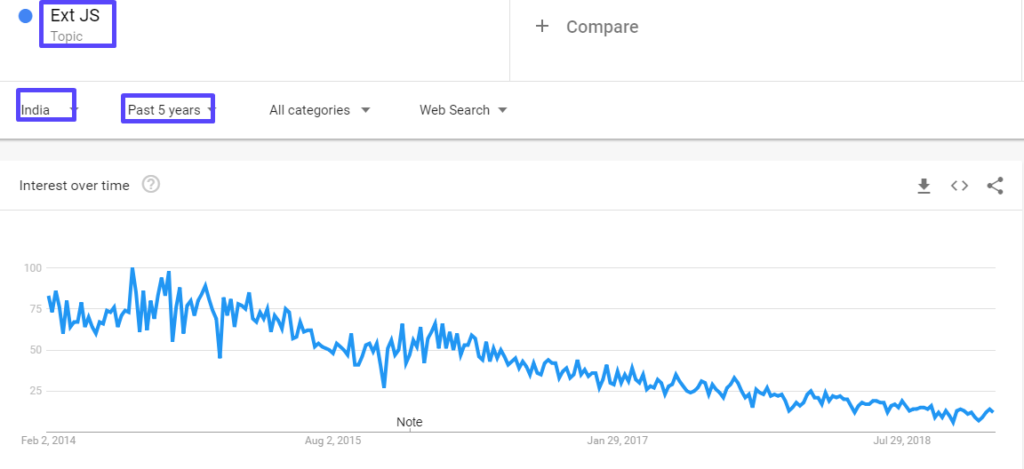
In the United Kingdom, Sencha Ext JS had the highest demand in 2014. After that, the interest declined. In 2020, this framework didn’t seem to be very popular among developers.
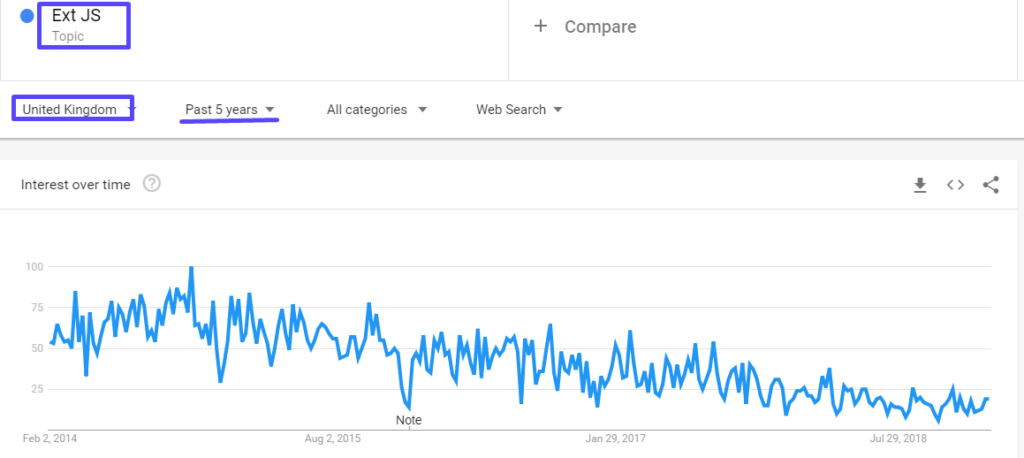
Keyword analysis based on Google Ads Keywords data
The statistics on Sencha Ext JS search volume in Google shows that since 2015, the interest in this framework has been falling. The situation on mobile devices is the opposite.

The largest share of Sencha Ext JS searches is distributed among the United States (20.8%), India (10.8%), Germany, the UK, and Japan.

Linkbase and the number of references on the web
The official Sencha Ext JS website is linked by 13099 domains with 1.19 million links in total. 83% of these links are dofollow. In addition to the JavaScript framework, this page also features other products.

The top domain rating positions are taken by world-renowned social media, information services, and portals.
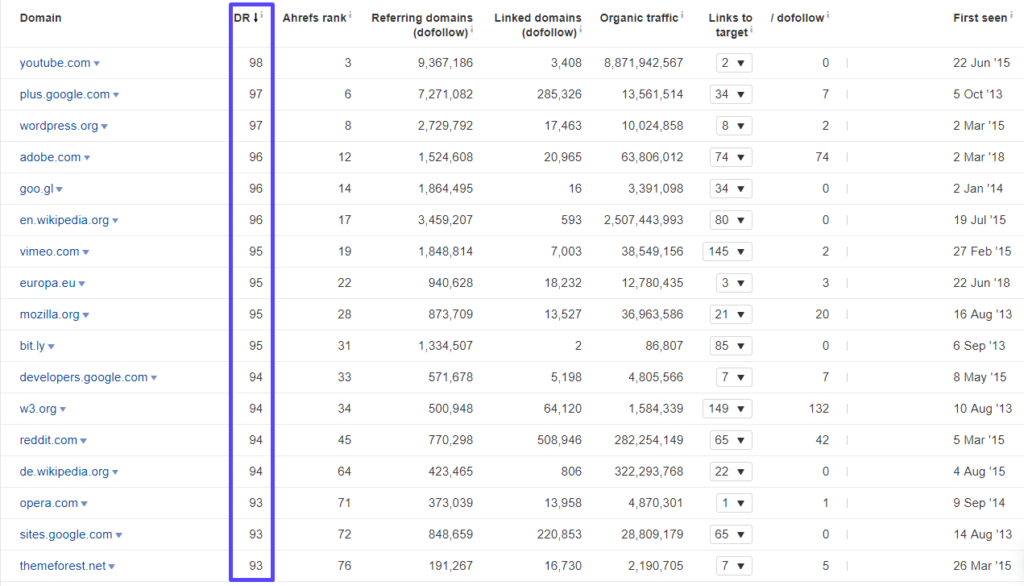
For Sencha Ext JS requests, Google offers 95500 results.

JS Framework Socket

The socket was developed as an event-oriented library for web app development and data transfer in real-time. WebSocket is used as the main protocol, but others are also supported. The interface remains the same in both cases. The socket is divided into 2 parts with a similar API: server-side for node.js and client-side running in a browser.
JS Framework popularity based on Google Trends data
The interest in Socket has started to grow in 2011. There was a minor decline after a peak in 2017. Nevertheless, this JavaScript framework remains highly demanded.
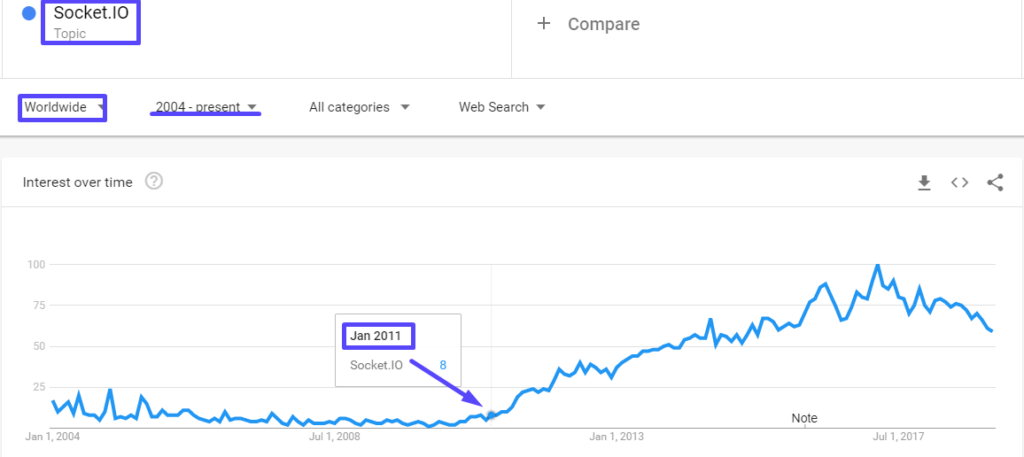
In the US, the popularity of Socket stays at the same level since 2014.
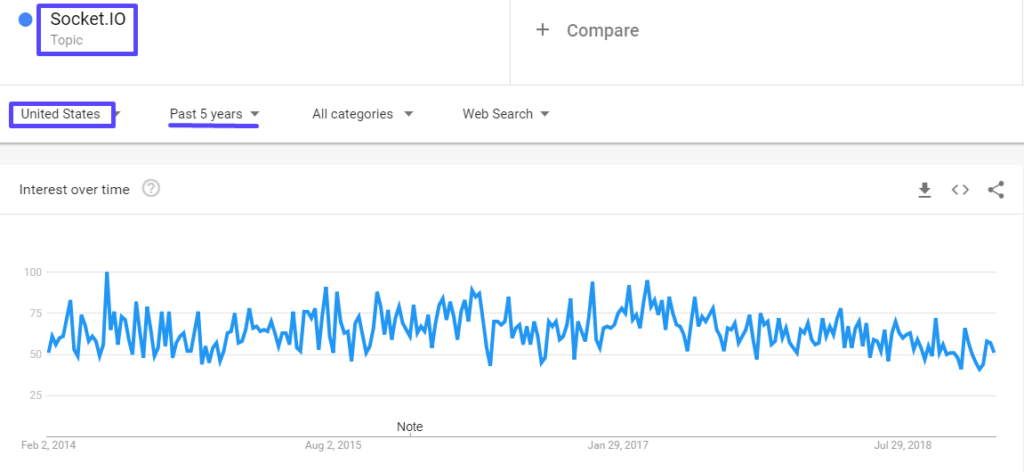
In India, there was a slight growth in the interest in Socket during the same period, followed by a subsequent decline.
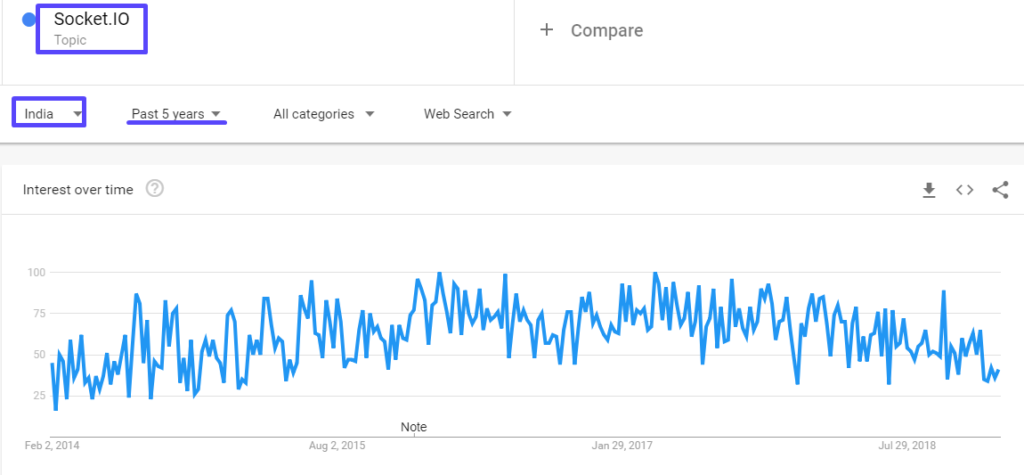
In the United Kingdom, the average popularity of this JavaScript framework remains unchanged.
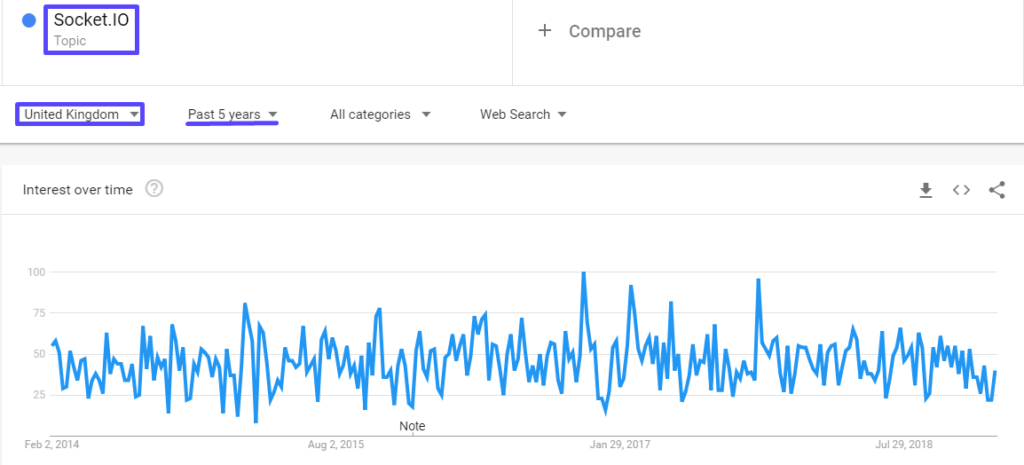
Keyword analysis based on Google Ads Keywords data
Judging by Google statistics on keyword search volume, since 2015, the interest in Socket has been growing. The same positive trend is present on mobile devices.

Users that have searched for Socket most often are mainly located in the US (16.3%), India (9.2%), Great Britain (4.5%), Germany (3.7%), and Japan (3.5%).

Linkbase and the number of references on the web
5280 domains contain links to Socket website. They locate 114,000 links, 81% of which are dofollow.

Speaking of their domain rating, information services and portals have the highest rates.
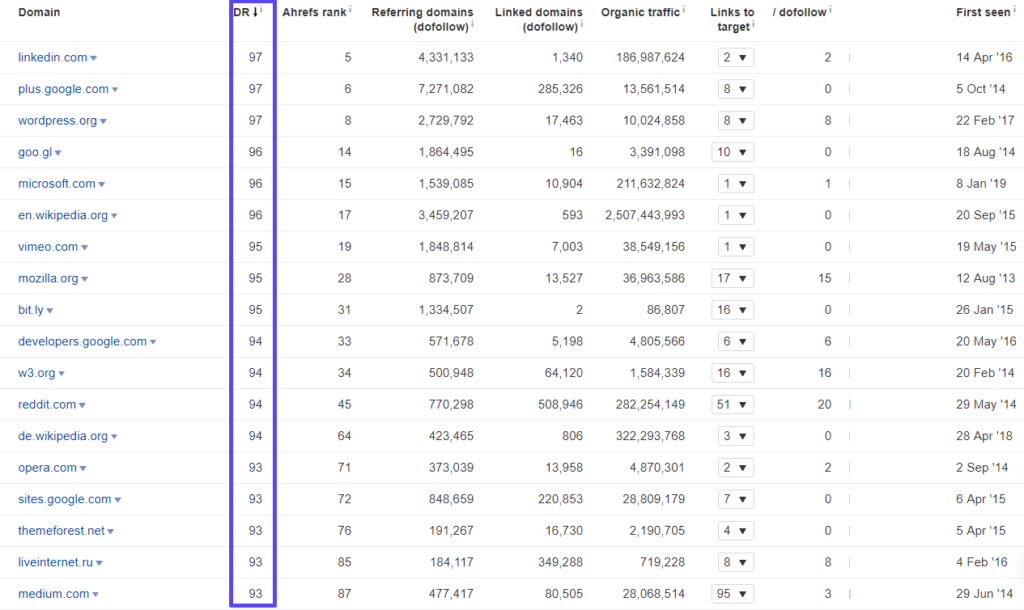
In general, there are ~3,770,000 mentions of the Socket framework on the web.

JS Framework Spine

The spine is a small MVC framework, largely based on Backbone.js API. Web applications are created in JavaScript, which ensures logical separation of the written code and model inheritance.
This framework is relatively simple and doesn’t take a lot of time to master—YoMoreover, youan use the Spine Mobile extension for working with mobile applications. Besides, the framework supports all modern browsers and can boast detailed documentation.
Spine JS popularity based on Google Trends data
Spine JS framework gained abrupt popularity in 2011. Yet the decline in the interest was equally sharp, and since 2013, the demand for Spine JS has remained quite low.
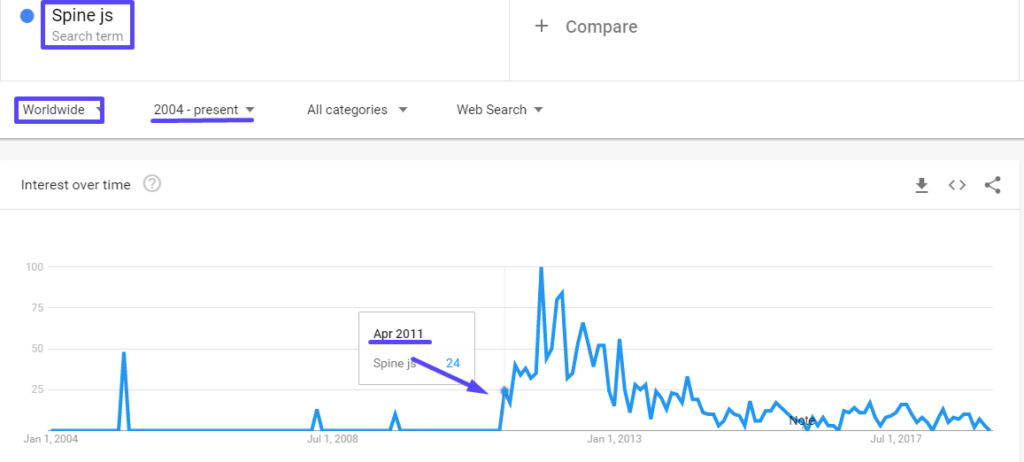
In the US, Spine JS rapidly reached its maximum in 2015, followed by a rollback after which its popularity stabilized.
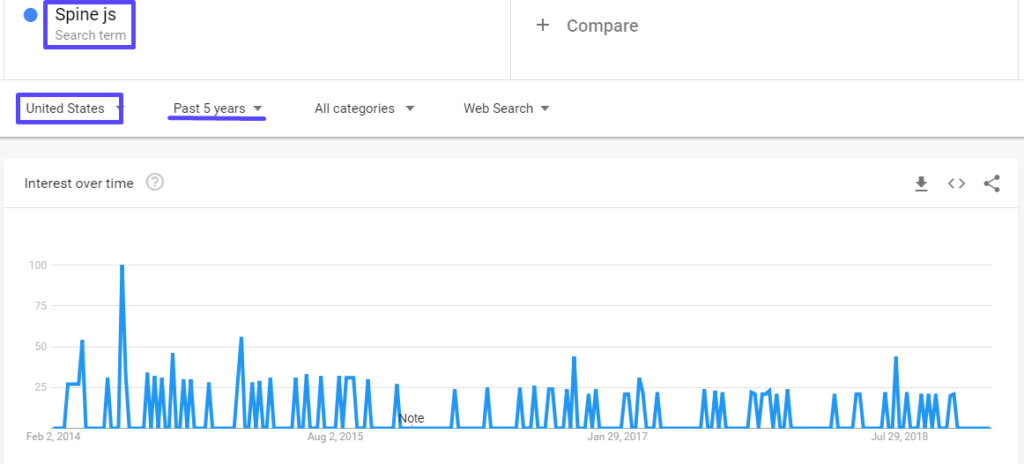
This JavaScript framework isn’t the most popular one. unfortunately, there’s no statistical data on India and the United Kingdom. This means that local developers showed almost no interest in Spine JS.
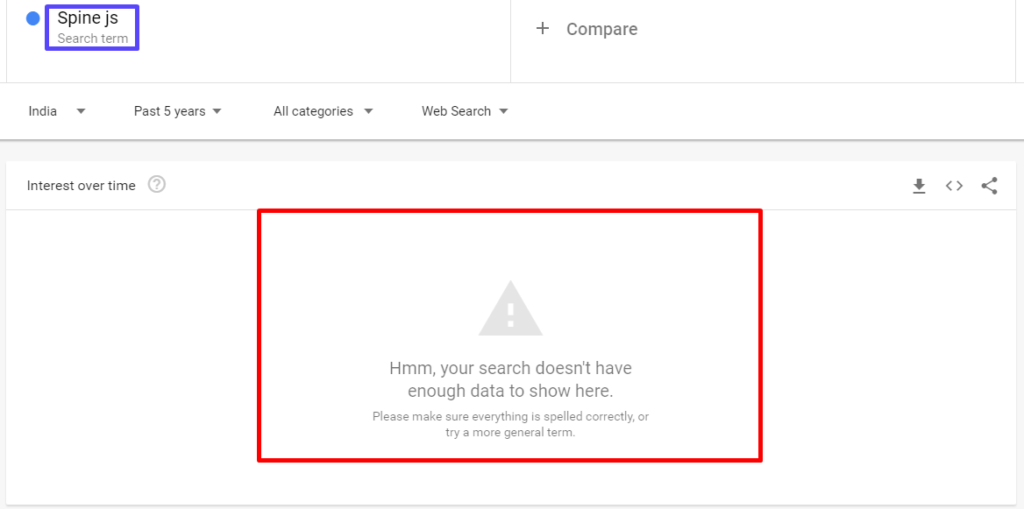
Keyword analysis based on Google Ads Keywords data
Based on Google’s search volume statistics, the interest in Spine JS has been declining since 2015. The initially low mobile traffic also continued to decrease.

The keyword search volume is distributed by country in the following way: the US (20.3%), India (7.3%), France (4.1%), Brazil (2.5%), and Indonesia (1.4%). The framework isn’t very popular in Europe.

Linkbase and the number of references on the web
There are only 43 domains referring to official Spine JS website with 152 links in total. 67% of them are dofollows. Such a low result additionally proves the small demand for Spine JS.

The highest domain rating belongs to such information portals and services as npmjs.com, hatenablog.com, and taobao.org. Unfortunately, these resources aren’t widely known.
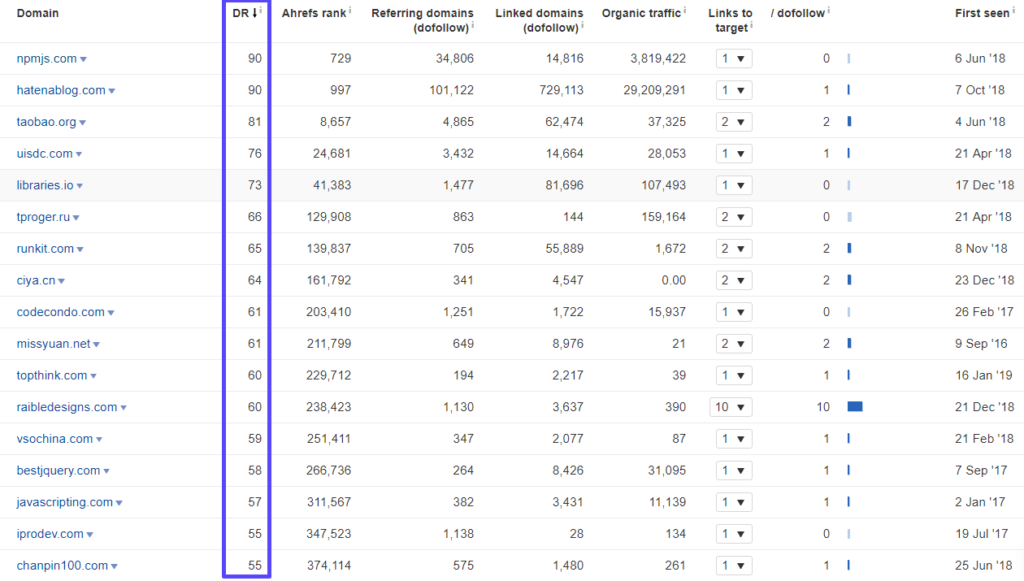
In total, Spine JS is mentioned ~16,600 times on the web.

JS Framework Titanium

Titanium JS is an open framework for developing native applications for mobile devices running Android, iOS, and Windows. It relies on the code created in Appcelerator.
Besides, this JavaScript framework uses Alloy to speed up operations on mobile devices. All created modules can be reused for various applications, which reduces the code volume and coding time.
Titanium JS popularity based on Google Trends data
The interest in the Titanium JS framework started to grow in 2012. After it reached its maximum in 2012, its popularity has started to decline. Eventually, in 2020, it was almost zero.
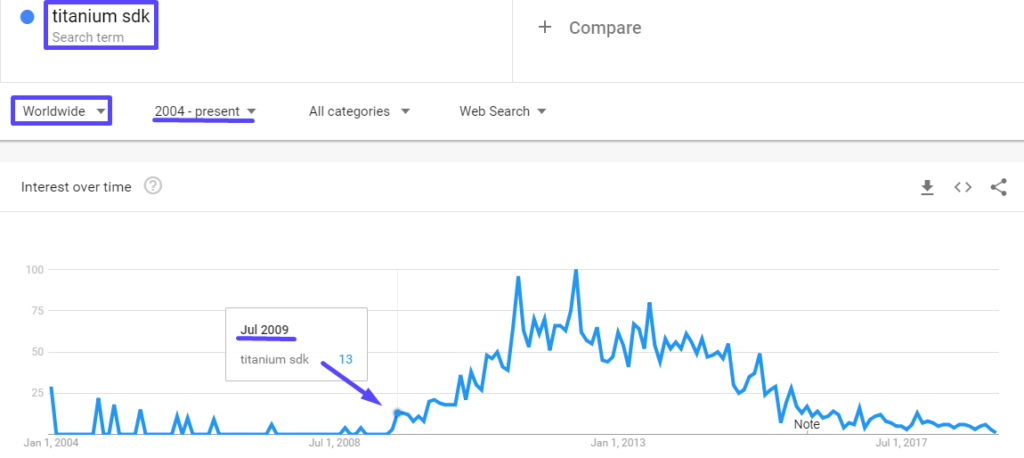
In the US, the popularity of the framework was rapidly growing since 2014. However, after that, it has slightly reduced and continues to remain at the same level.
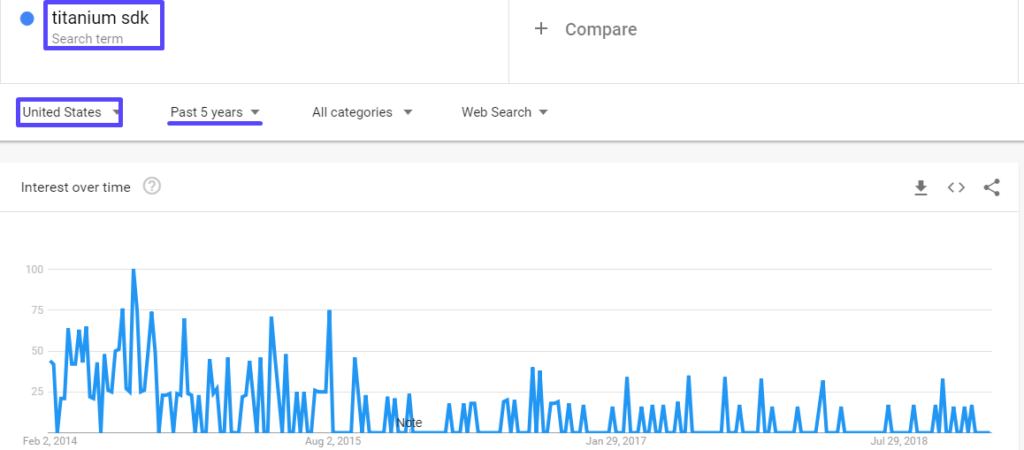
There are no statistics on India and the United Kingdom. This means that the popularity of Titanium JS is very low there.
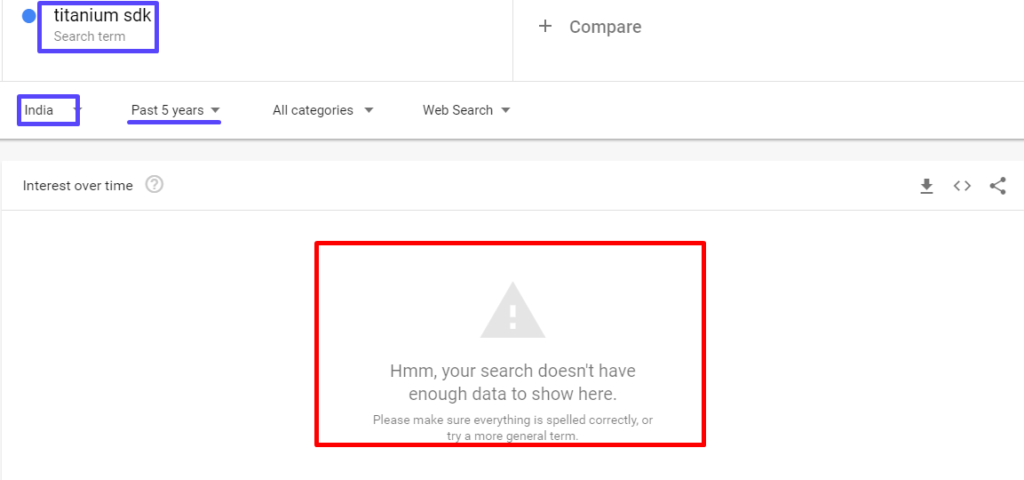
Keyword analysis based on Google Ads Keywords data
Google’s statistic shows that since 2015, the search volume of Titanium JS has been falling. In 2016, this indicator stabilized and has remained almost unchanged for several years. The search volume on mobile devices is gradually increasing.

Users from the United States (21.7%), India (10.0%), Brazil (5.1%), Japan (3.9%), and Turkey (1.1%) have done the most searches.

Linkbase and the number of references on the web
The official Titanium JS website is linked by 6065 domains. They include 113,000 links, 82% of which are dofollow.

Social media and information resources have the highest domain rating.
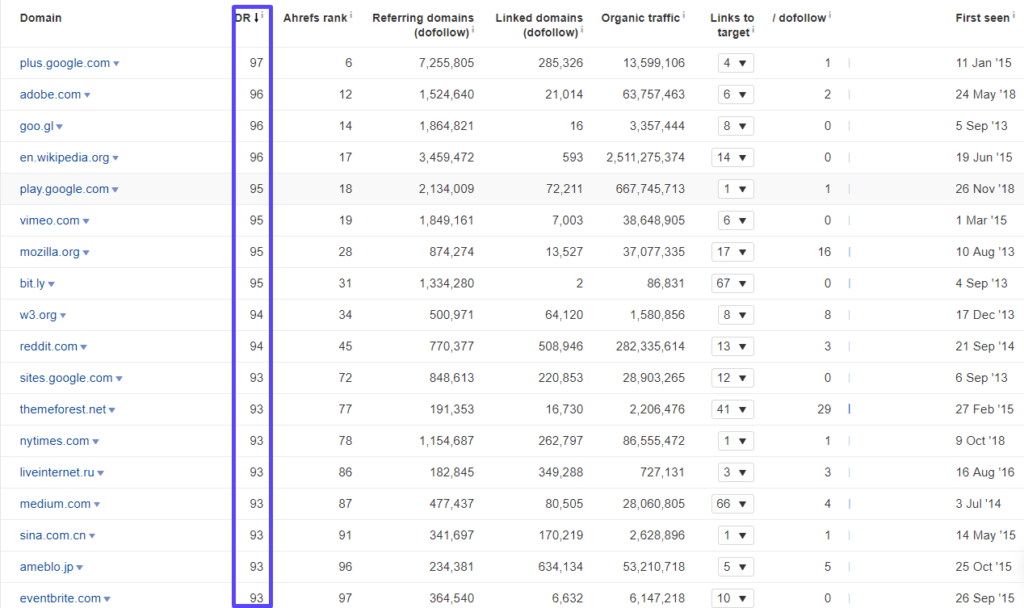
There are 49,000 web results for Titanium JS (quite a low volume compared to other frameworks).

JS Framework Vue.js

VueJS is a framework for building user interfaces. If used with other libraries and tools, Vue JS can also be suitable to develop one-page applications.
Its key difference from other JavaScript frameworks is that Vue JS isn’t a monolith and can gradually be introduced into a project. as a result, you can easily integrate it into the project that has already started.
VueJS popularity based on Google Trends data
VueJS began to gain popularity right after its release in 2015. There wasn’t any considerable decline yet; the JavaScript framework remains popular.
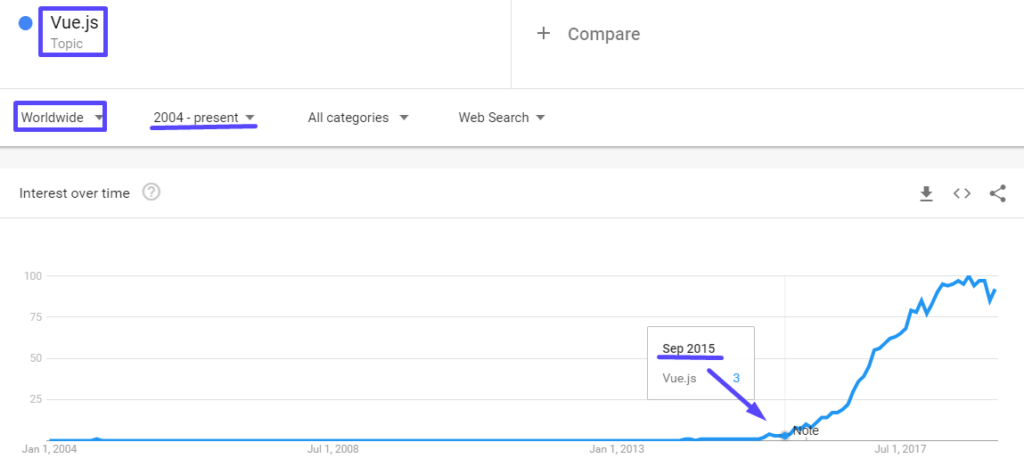
In the US, the interest in the Vue JS framework is at its peak.
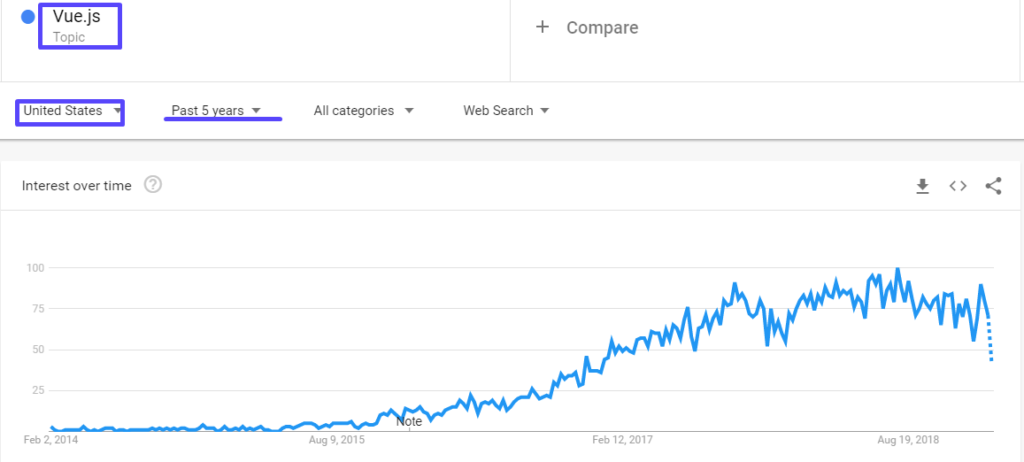
The situation in India is similar. The popularity of Vue JS has significantly increased and remains at the same level.
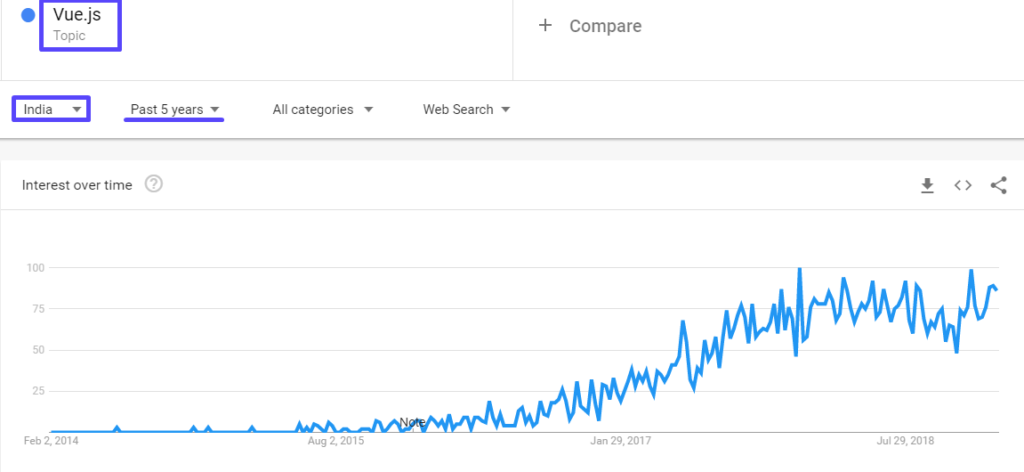
The United Kingdom shows the same trend – continuous growth and increasing demand for the framework.
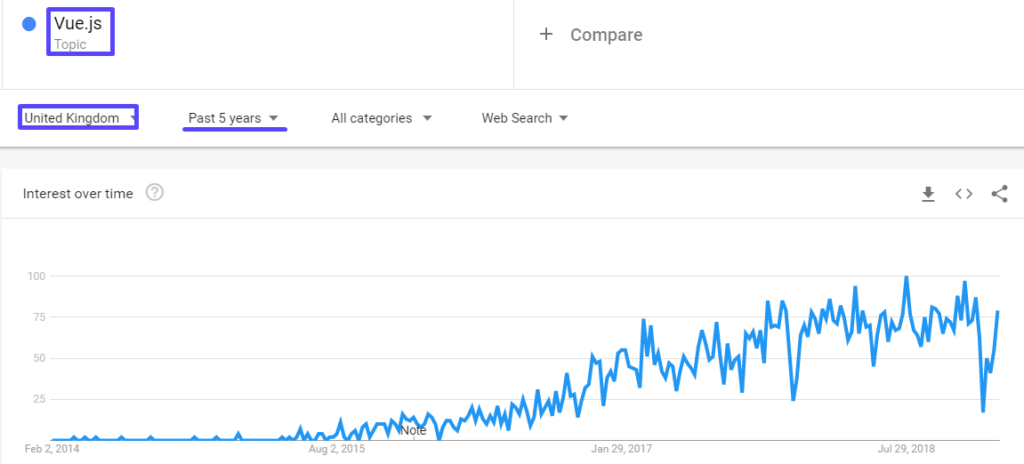
Keyword analysis based on Google Ads Keywords data
Vue JS search volume in Google shows the rapid growth of the interest in this framework since 2015. The picture in the mobile segment is the same.

Based on Google’s statistics, the Vue JS search query is the most common in the UK (25.1%), the US (13.3%), Japan (5.6%), India (3.6%), and the Netherlands (1.8%).

Linkbase and the number of references on the web
522000 links to Vue JS website can be found on 9929 domains. This number comprises 82% of dofollows.

If we rank the referring domains by domain rating, we’ll see that social media, information portals, and globally renowned services have top results.
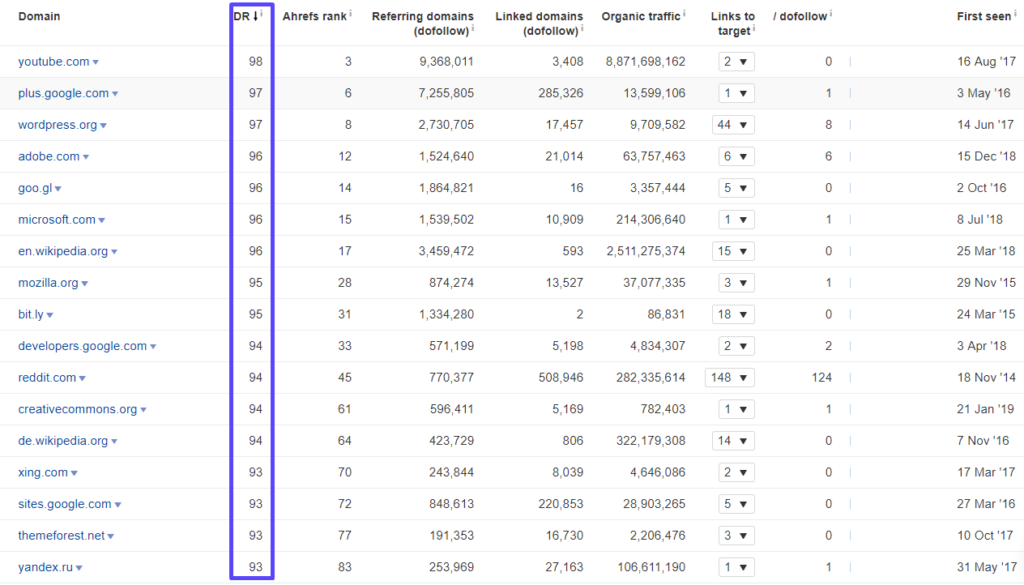
There are nearly 7,780,000 mentions of the Vue JS framework on the web.

Summary
In 2020, Vue JS, Socket, React JS, Node JS, Ember JS, and Angular JS were the most popular frameworks. Their demand graphs and search volume in Google prove the user interest.
This doesn’t mean that other JavaScript frameworks are not as good or cannot deal with the tasks they were created for. Every JavaScript framework goes through the interest growth and decline phases. The listed technologies either have the highest popularity or have started to lose it recently. There are also several frameworks with low demand.
In the future, with the release of new JavaScript frameworks, the picture is likely to change. We will have new leaders and favorites. So far, almost all development tasks can be solved with the mentioned JS frameworks.
